
 |
home ao english musik literatur journalismus bilder sprachen mehr shop sitemap | |
In Japan 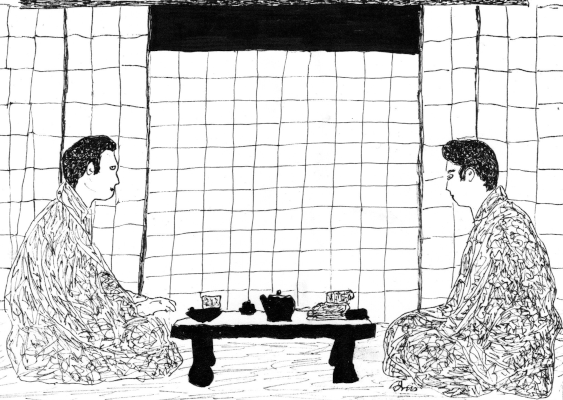 |
In Japan  |
Au Japon  |
In Giappone  |
En Japón  |
(Deutsch) Dies ist die linguistische Version der neunten Staffel der Jungs. Die Texte sind dieselben wie auf der Hauptseite. |
(English) This is the linguistic version of the ninth season of the Boys. The texts are the same as on the main page. |
(Français) Voici la version linguistique de la neuvième saison des Gars. Les textes sont les mêmes que sur la page principale. |
(Italiano) Questa è la versione linguistica della nona stagione dei Ragazzi. I testi sono gli stessi della pagina principale. |
(Español) Esta es la versión lingüística de la novena temporada de los Chicos. Los textos son los mismos que en la página principal. |
(English) Helmut's parents are staying over, as they are about to become grandparents, and the father-to-be has gone to great lengths to make them comfortable. However, the family idyll is disturbed by two visitors who have had a long flight. |
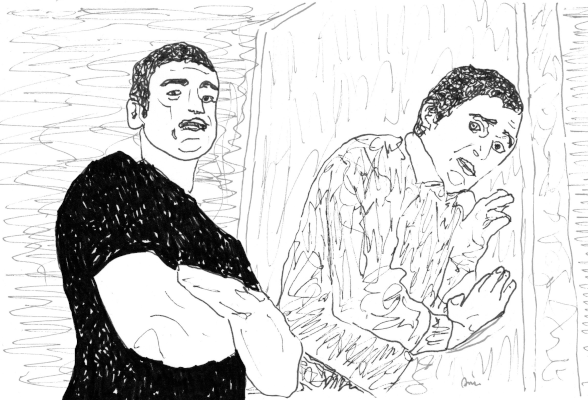 |
(Italiano) I genitori di Helmut sono ospiti, in quanto stanno per diventare nonni, e il futuro padre ha fatto di tutto per metterli a proprio agio. Tuttavia, l'idillio familiare viene disturbato da due visitatori che hanno fatto un lungo viaggio in aereo. |
(Deutsch) Helmuts Eltern sind zu Gast, da sie nun bald Großeltern werden, und der werdende Vater hat sich alle Mühe gegeben, um es ihnen behaglich zu machen. Das Familienidyll wird allerdings von zwei Besuchern gestört, die eine lange Flugreise hinter sich haben. Normal Version | ||
Tag 1 1 Helmut: Mama, du musst nicht ... Ich hab das Schlafzimmer doch gestern gewischt, das ist ... Was? Ja, der Schrubber ist im Bad. Aber ... |
Day 1 Helmut: Mom, you don't have to... I mopped the bedroom yesterday, that's... What? Yes, the scrubber is in the bathroom. But... |
Jour 1 Helmut : Maman, tu n'as pas à... J'ai passé la serpillière dans la chambre hier, c'est... Quoi ? Oui, le balai-brosse est dans la salle de bains. Mais... |
Giorno 1 Helmut: Mamma, non devi... Ho lavato la camera da letto ieri, è... Cosa? Sì, il mocio è in bagno. Ma... |
Día 1 Helmut: Mamá, no hace falta que... Ayer fregué el dormitorio, eso es... ¿Qué? Sí, la fregona está en el cuarto de baño. Pero... |
2 Heinz: Das ist Quatsch, ich will einfach kurz mal mit Helmut reden. Setzen Sie sich, ich mach Ihnen das Video an. Da, sehen Sie, die stolze werdende Mutter im Kreis ihrer Familie. Goldig, oder? So, bis gleich! |
Heinz: That's nonsense, I just want to have a quick word with Helmut. Sit down, I'll turn on the video. There, you see, the proud mother-to-be surrounded by her family. Gorgeous, isn't it? OK, see you soon! |
Heinz : C'est des conneries, je veux juste dire un mot à Helmut. Asseyez-vous, je vais mettre la vidéo. Là, vous voyez, la fière future maman entourée de sa famille. Mignon, n'est-ce pas ? Voilà, à tout de suite ! |
Heinz: Non ha senso, voglio solo scambiare due parole con Helmut. Sedetevi, accendo il video. Ecco, guardate, la futura mamma orgogliosa circondata dalla sua famiglia. Carino, vero? Allora, a presto! |
Heinz: Tonterías, sólo quiero hablar un momento con Helmut. Siéntense, voy a poner el vídeo. Ahí, ya ven, la orgullosa futura madre rodeada de su familia. Precioso, ¿verdad? Pues, hasta pronto. |
3 Heinz: Du hast sie selbst eingeladen, Mann. Sie wollten in ein Hotel gehen. Du musstest sie sogar überreden. |
Heinz: You invited them yourself, man. They wanted to go to a hotel. You even had to persuade them. |
Heinz : Tu les as invités toi-même, mec. Ils voulaient aller à l'hôtel. Tu as même dû les convaincre. |
Heinz: Li hai invitati tu stesso, amico. Volevano andare in un hotel. Hai dovuto persino convincerli. |
Heinz: Tú mismo los invitaste, tío. Querían ir a un hotel. Incluso tuviste que convencerles. |
4 Heinz: Anstatt sich zu freuen, dass sie Großeltern werden, und dir zu deinem Vermögen und deinen Mystery-Fähigkeiten zu gratulieren ... |
Heinz: Instead of being happy that they're going to be grandparents and congratulating you on your wealth and your mystery abilities... |
Heinz : Au lieu d'être heureux qu'ils deviennent grands-parents et de te féliciter pour ta fortune et tes pouvoirs de mystère... |
Heinz: Invece di essere felici che diventeranno nonni e di congratularsi con te per la tua ricchezza e i tuoi poteri del mistero... |
Heinz: En lugar de alegrarse de que vayan a ser abuelos y felicitarte por tu riqueza y tus poderes de misterio... |
5 Heinz: Die Frage ist, was wir jetzt machen sollen. Drei Tage sind wirklich kein Pappenstiel. |
Heinz: The question is what we're supposed to do now. Three days really is no trifling matter. |
Heinz : La question est de savoir ce que nous allons faire maintenant. Trois jours, ce n'est vraiment pas rien. |
Heinz: La domanda è cosa dobbiamo fare ora. Tre giorni non sono davvero una cosa da poco. |
Heinz: La cuestión es qué debemos hacer ahora. Tres días no es un asunto baladí. |
6 Heinz: Dein Vater hat schon aufgemacht. War ja klar. |
Heinz: Your father has already opened the door. Of course he did. |
Heinz : Ton père a déjà ouvert la porte. Bien sûr qu'il l'a fait. |
Heinz: Tuo padre ha già aperto la porta. Certo che l'ha fatto. |
Heinz: Tu padre ya ha abierto la puerta. Claro que sí. |
7 Heinz: (...) Also, ich weiß nicht. Lasst uns erst mal was zu essen bestellen. Wie wär's mit Sushi? |
Heinz: (...) Well, I don't know. Let's order something to eat first. How about sushi? |
Heinz : (...) Eh bien, je ne sais pas. Commandons d'abord quelque chose à manger. Pourquoi pas des sushis ? |
Heinz: (...) Beh, non lo so. Prima ordiniamo qualcosa da mangiare. Che ne dite del sushi? |
Heinz: (...) Bueno, no sé. Primero pidamos algo de comer. ¿Qué tal sushi? |
8 Helmut: Bis dahin sind wir zurück. Es geht doch nur um die Abgabefrist für sein Forschungspapier! Das sind drei Wochen. Er ist extra angereist, um uns persönlich zu fragen! |
Helmut: We'll be back by then. It's only the deadline for his research paper that matters! That's three weeks. He came all the way here to ask us in person! |
Helmut : Nous serons de retour d'ici là. Tout ce qui compte, c'est le délai de remise de son papier de recherche ! C'est trois semaines. Il a fait tout ce chemin pour nous le demander en personne ! |
Helmut: Saremo di ritorno per allora. Si tratta solo della scadenza del suo lavoro di ricerca! Sono tre settimane. Ha fatto tutta questa strada per chiedercelo di persona! |
Helmut: Volveremos para entonces. Lo único que importa es el plazo de entrega de su trabajo de investigación. Son tres semanas. ¡Ha viajado hasta aquí para pedírnoslo en persona! |
9 Helmut: Ein Knopfdruck und wir kriegen noch Flugtickets für morgen. Ren? Ja, ein Knopfdruck. |
Helmut: One push of a button and we still get plane tickets for tomorrow. Ren? Yes, one push of a button. |
Helmut : Une pression sur un bouton et nous aurons encore des billets d'avion pour demain. Ren ? Oui, une simple pression sur un bouton. |
Helmut: Basta premere un pulsante e avremo ancora i biglietti aerei per domani. Ren? Sì, basta premere un pulsante. |
Helmut: Basta con pulsar un botón y tendremos aún billetes de avión para mañana. ¿Ren? Sí, con sólo pulsar un botón. |
(English) As soon as the Boys arrive at their protégé's shared apartment, Helmut's caring instinct awakens. With meticulousness and passion, he makes sure that nothing can happen to Takumi. Heinz, by contrast, first has to get used to the new situation. |
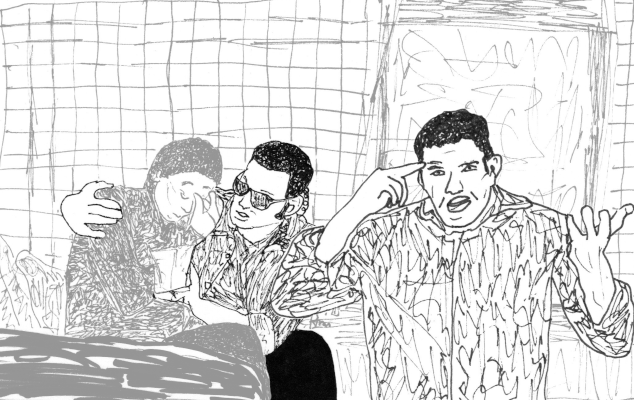 |
(Italiano) Non appena i Ragazzi arrivano nell'appartamento condiviso dal loro protetto, l'istinto di cura di Helmut si risveglia. Con meticolosità e passione, si assicura che non accada nulla a Takumi. Heinz, invece, deve prima abituarsi alla nuova situazione. |
(Deutsch) Kaum sind die Jungs in der Gemeinschaftswohnung ihres Schützlings angekommen, erwacht Helmuts Fürsorgeinstinkt. Mit Akribie und Leidenschaft stellt er sicher, dass Takumi nichts passieren kann. Heinz hingegen muss sich an die neue Situation erst gewöhnen. Normal Version | ||
Tag 3 1 Heinz: Du nimmst deine Aufgabe ernst, wie man sieht. |
Day 3 Heinz: You take your job seriously, obviously. |
Jour 3 Heinz : Tu prends ton travail au sérieux, comme on peut le voir. |
Giorno 3 Heinz: Come si vede, prendi sul serio il tuo lavoro. |
Día 3 Heinz: Te tomas en serio tu trabajo, como podemos ver. |
2 Helmut: Ich weiß schon, was ich tue. So, Zeit für einen Kontrollblick aus dem Fenster. |
Helmut: I know what I'm doing. Right, time to look out of the window and check. |
Helmut : Je sais ce que je fais. Bon, il est temps de jeter un coup d'il de contrôle par la fenêtre. |
Helmut: So cosa sto facendo. Bene, è ora di dare un'occhiata di controllo fuori dalla finestra. |
Helmut: Sé lo que hago. Bien, es hora de echar un vistazo por la ventana. |
3 Heinz: Jetzt setz dich mal gegenüber hin und lass Takumi ein bisschen Platz zum Atmen! |
Heinz: Now sit down opposite and give Takumi a bit of space to breathe! |
Heinz : Allez, assieds-toi en face maintenant et laisse Takumi respirer un peu ! |
Heinz: Ora siediti di fronte e lascia a Takumi un po' di spazio per respirare! |
Heinz: ¡Vamos, siéntate ahora delante y deja que Takumi respire un poco! |
4 Heinz: Idiot! |
Heinz: Idiot! |
Heinz : Idiot ! |
Heinz: Idiota! |
Heinz: ¡Idiota! |
5 Helmut: Wichtig ist allein Takumi. |
Helmut: Only Takumi matters. |
Helmut : Seul Takumi est important. |
Helmut: Solo Takumi è importante. |
Helmut: Sólo Takumi es importante. |
6 Heinz: Also, ich brauch erst mal eine Mütze voll Schlaf. |
Heinz: Well, I need a good night's sleep for starters. |
Heinz : Eh bien, j'ai besoin d'une bonne nuit de sommeil pour commencer. |
Heinz: Beh, prima ho bisogno di una buona notte di sonno. |
Heinz: Bueno, primero necesito dormir bien. |
7 Helmut: Ja ja. Rechts, links ... Was ...? |
Helmut: Yes, yes. Right, left... What...? |
Helmut : Oui, oui. Droite, gauche... Qu'est-ce que... ? |
Helmut: Sì, sì. Destra, sinistra... Cosa...? |
Helmut: Sí, sí. Derecha, izquierda... ¿Qué...? |
(English) The first morning in Tokyo. The six flatmates sit at the breakfast table before going to the laboratory where Takumi and the others work. Heinz carefully and sensitively points out to Helmut the advantages of adapting to local customs and traditions. |
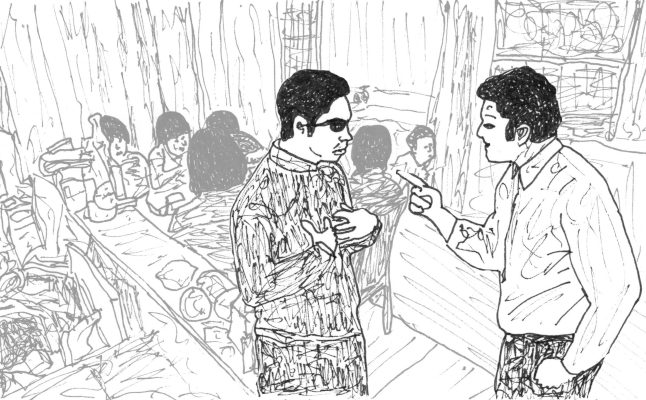 |
(Italiano) La prima mattina a Tokyo. I sei coinquilini si siedono al tavolo della colazione prima di recarsi al laboratorio dove lavorano Takumi e gli altri. Heinz fa notare a Helmut, con attenzione e sensibilità, che l'adattamento agli usi e costumi locali presenta dei vantaggi. |
(Deutsch) Der erste Morgen in Tokio. Zu sechst sitzen die WG-Bewohner am Frühstückstisch, bevor sie ins Labor gehen, in dem Takumi und die anderen arbeiten. Heinz macht Helmut vorsichtig und einfühlsam darauf aufmerksam, dass eine Anpassung an die lokalen Sitten und Gebräuche Vorteile birgt. Normal Version | ||
Tag 4 1 Helmut: Moin! |
Day 4 Helmut: Morning! |
Jour 4 Helmut : Bonjour ! |
Giorno 4 Helmut: Buongiorno! |
Día 4 Helmut: ¡Buenos días! |
2 Heinz: Komm erst mal frühstücken! Takumi, Akira, Ren und Naoki sitzen schon im Wohnzimmer. |
Heinz: Have some breakfast first! Takumi, Akira, Ren and Naoki are already sitting in the living room. |
Heinz : Viens d'abord prendre ton petit déjeuner ! Takumi, Akira, Ren et Naoki sont déjà assis dans le salon. |
Heinz: Ma vieni a fare colazione prima! Takumi, Akira, Ren e Naoki sono già seduti in salotto. |
Heinz: ¡Primero venga a desayunar! Takumi, Akira, Ren y Naoki ya están sentados en el salón. |
3 Helmut: Na super. Gibt's hier gar kein Brot? Takumi? Bread? |
Helmut: Great. Is there no bread here? Takumi? Bread? |
Helmut : Super. Il n'y a pas de pain ici ? Takumi ? Bread ? |
Helmut: Ottimo. Non c'è pane qui? Takumi? Bread? |
Helmut: Estupendo. ¿No hay pan aquí? ¿Takumi? ¿Bread? |
4 Helmut: Was? Ach so, ja klar. Fumm. Autsch! |
Helmut: What? Oh, right. Fumm. Ouch! |
Helmut : Quoi ? Ah oui, bien sûr. Foum. Aïe ! |
Helmut: Cosa? Oh, giusto. Fumm. Ahi! |
Helmut: ¿Qué? Ah, claro. Fumm. ¡Ay! |
5 Heinz: Dein Toast riecht ein bisschen angebrannt. |
Heinz: Your toast smells a bit burnt. |
Heinz : Ton toast sent un peu le brûlé. |
Heinz: Il tuo toast sa un po' di bruciato. |
Heinz: Tu tostada huele un poco a quemado. |
6 Heinz: Nein, zu weit würde ich gehen, wenn ich sagen würde, dass du dich genauso verhältst wie deine Eltern! Kommst irgendwo in der Fremde an und gehst sofort allen auf die Nüsse! |
Heinz: No, I'd be going too far if I said that you're behaving exactly like your parents! You arrive somewhere foreign and immediately piss everyone off! |
Heinz : Non, j'irais trop loin si je disais que tu te comportes exactement comme tes parents ! Tu arrives quelque part à l'étranger et tu fais tout de suite chier tout le monde ! |
Heinz: No, esagererei se dicessi che ti stai comportando proprio come i tuoi genitori! Arrivi in un posto straniero e dai subito fastidio a tutti! |
Heinz: ¡No, iría demasiado lejos si dijera que te comportas exactamente igual que tus padres! ¡Llegas a un lugar extranjero e inmediatamente cabreas a todo el mundo! |
7 Helmut: Oh, Scheiße. |
Helmut: Oh, shit. |
Helmut : Oh, merde. |
Helmut: Oh, merda. |
Helmut: Oh, mierda. |
(English) Heinz and Helmut continue their conversation on the way to the lab. Helmut feels misunderstood. Heinz does indeed have some valid objections, but his entire line of argument collapses before they have even reached Takumi's workplace. |
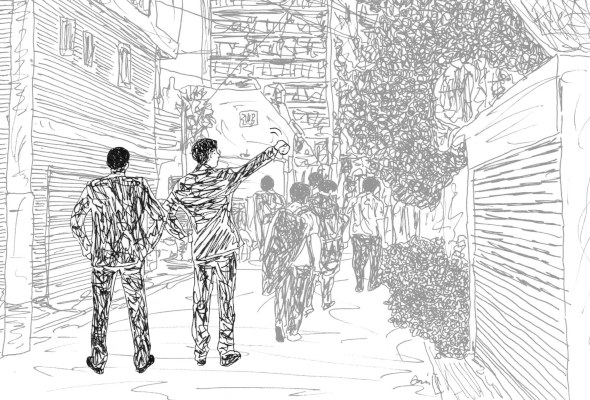 |
(Italiano) Heinz e Helmut continuano la loro conversazione mentre si recano al laboratorio. Helmut si sente incompreso. Heinz ha effettivamente delle obiezioni valide, ma la sua argomentazione crolla prima ancora di raggiungere il posto di lavoro di Takumi. |
(Deutsch) Auf dem Weg ins Labor führen Heinz und Helmut ihr Gespräch fort. Helmut fühlt sich unverstanden. Tatsächlich hat Heinz einige berechtigte Einwände, doch fällt seine gesamte Argumentationslinie in sich zusammen, noch bevor sie Takumis Arbeitsstelle erreicht haben. Normal Version | ||
Der Baseball Tag 4 1 Helmut: Praktisch, dass sie in der Nähe ihres Labors wohnen. Die Japaner denken einfach praktisch. |
The Baseball Day 4 Helmut: It's practical that they live near their laboratory. The Japanese simply think practically. |
Jour 4 Helmut : C'est pratique qu'ils vivent près de leur laboratoire. Les Japonais ont l'esprit pratique, tout simplement. |
Giorno 4 Helmut: È pratico che vivano vicino al loro laboratorio. I giapponesi pensano semplicemente in modo pratico. |
Día 4 Helmut: Es práctico que vivan cerca de su laboratorio. Los japoneses simplemente piensan de forma práctica. |
2 Helmut: Oh Mann, jetzt machst du mir ein schlechtes Gewissen. |
Helmut: Oh man, now you're making me feel guilty. |
Helmut : Oh mec, maintenant tu me fais culpabiliser. |
Helmut: Cavolo, ora mi fai sentire in colpa. |
Helmut: Tío, ahora me haces sentir culpable. |
3 Helmut: Lappalien! Mann, das mit den Polizisten gestern hab ich doch auch gut geregelt. |
Helmut: Trifles! Man, I really handled the policemen well yesterday too. |
Helmut : Des broutilles ! Mec, j'ai très bien géré les policiers hier aussi. |
Helmut: Bagatelle! Amico, per esempio me la sono cavata bene con i poliziotti ieri. |
Helmut: ¡Bagatelas! Tío, ayer por ejemplo me manejé muy bien con los policías. |
4 Helmut: In den nächsten Tagen will ich mich mal ein bisschen in diese Algensache reinfuchsen. Scheint ja ziemlich interessant zu sein. Ffffffffff schp-h. Bionik und das. |
Helmut: Over the next few days, I want to dig into this algae thing a bit. Seems to be quite interesting. Ffffffffffff shp-h. Bionics and all that. |
Helmut : Dans les prochains jours, je vais me pencher un peu sur cette histoire d'algues. Il semble que ce soit très intéressant. Ffffffff chp-h. La bionique et tout ça. |
Helmut: Nei prossimi giorni voglio approfondire un po' questa storia delle alghe. Sembra essere molto interessante. Ffffffffff shp-h. La bionica e tutto. |
Helmut: En los próximos días quiero familiarizarme un poco con esto de las algas. Parece bastante interesante. Ffffffffffff shp-h. Biónica y eso. |
5 Heinz: Takumi hat jetzt erst geschnallt, was passiert ist. Er ist kreidebleich geworden. |
Heinz: Takumi has only just realized what's happened. He's gone white as a sheet. |
Heinz : Takumi vient seulement de réaliser ce qui s'est passé. Il est devenu blanc comme un linge. |
Heinz: Takumi si è appena reso conto di quello che è successo. È diventato bianco come un lenzuolo. |
Heinz: Takumi acaba de darse cuenta de lo que ha pasado. Se ha quedado blanco como la leche. |
6 Helmut: (...) Gib mir mal den Übersetzer, bitte! OK. Äh, hören Sie, mein Herr, wir müssen dann mal weiter. |
Helmut: (...) Give me the translator, please! OK. Uh, listen, sir, we have to get going. |
Helmut : (...) Donne-moi le traducteur, s'il te plaît ! OK. Euh, écoutez, monsieur, nous devons y aller. |
Helmut: (...) Dammi il traduttore, per favore! OK. Ascolti, signore, dobbiamo andare. |
Helmut: (...) ¡Dame el traductor, por favor! Vale. Ehm, escucha, señor, tenemos que irnos. |
7 Heinz: Ts. |
Heinz: Tsk. |
Heinz : Ts. |
Heinz: Ts. |
Heinz: Ts. |
(English) This two hundred and fiftieth episode of the Boys is all about... the Gals. There's a lot going on at the PR agency. Not only is Fiona angry with Heinz, she also has to put up with a new colleague who is messing up her work. Fanni, on the other hand, takes everything with Far Eastern equanimity. |
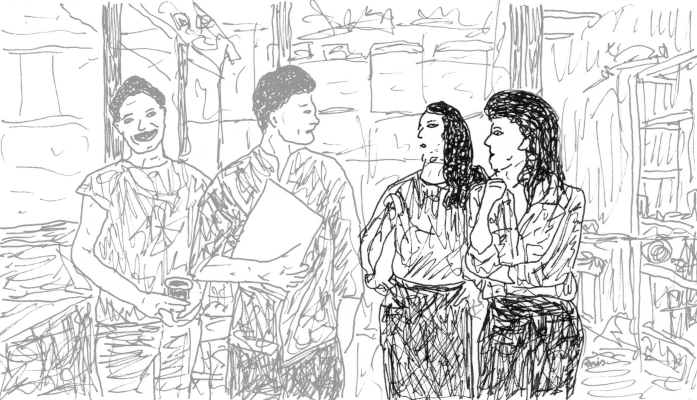 |
(Italiano) Questo duecentocinquantesimo episodio dei Ragazzi è dedicato... alle Ragazze. All'agenzia di PR stanno succedendo molte cose. Fiona non solo è arrabbiata con Heinz, ma deve anche sopportare una nuova collega che le sta rovinando il lavoro. Fanni, invece, prende tutto con la serenità dell'Estremo Oriente. |
(Deutsch) Diese zweihundertfünfzigste Episode der Jungs gehört ... den Mädels. Es tut sich einiges in der PR-Agentur. Nicht nur, dass Fiona wütend auf Heinz ist, sie muss auch die neue Kollegin ertragen, die ihre Arbeit durcheinanderbringt. Fanni hingegen nimmt alles mit fernöstlicher Gelassenheit. Normal Version | ||
Die Neue Tag 4 1 Fanni: Hedu hat ... Huup! Rumpel schepper, huup huuuup! |
Day 4 Fanni: Hedu has... Hoot! Rumble rattle, hoot toooot! |
Jour 4 Fanni : Hédou a... Houu ! Brrtr cr-cr boum, Houu houuuu ! |
Giorno 4 Fanni: Hedu ha... Huup! Bacca-batt bum scioppa, Yuuyuu tuuuut! |
Día 4 Fanni: Hedu ha... ¡Chuu! ¡Bacca-batt bum choppa, yuuyuu tuuuut! |
2 Fanni: Ach so, Wolfgang, hast du den Grafikentwurf für die Scheuermann-Broschüre gesehen? Hab ich dir vorhin in dein Fach gelegt. Ja, die mit den Manga- und Anime-Figuren. Wie gewünscht. Ich ... äh ... ja. Weg ist er. |
Fanni: By the way, Wolfgang, have you seen the graphic design for the Scheuermann brochure? I put it in your mail slot earlier. Yes, the one with the manga and anime characters. As requested. I... uh... yes. Gone he is. |
Fanni : Au fait, Wolfgang, tu as vu la conception graphique de la brochure Scheuermann ? Je l'ai mise dans ton casier tout à l'heure. Oui, celle avec les personnages de manga et d'anime. Comme demandé. Je... euh... oui. Il est parti. |
Fanni: A proposito, Wolfgang, hai visto la bozza grafica della brochure Scheuermann? L'ho messo nel tuo casellario prima. Sì, quella con i personaggi dei manga e degli anime. Come richiesto. Io... ehm... beh. È andato via. |
Fanni: Por cierto, Wolfgang, ¿has visto el diseño gráfico del folleto de Scheuermann? Te lo he puesto antes en tu bandeja. Sí, el de los personajes de manga y anime. Como se pidió. Yo... um... bueno. Se ha ido. |
3 Fanni: Punkt 5 ist gar nicht schlecht. Hier, das: Kinderbelustigung im Sommer auf dem Rasen. Mit der neuen Gartenschlauchkollektion in Regenbogenfarben. |
Fanni: Point 5 is not so bad. Here, this: children's amusement on the lawn in summer. With the new garden hose collection in rainbow colors. |
Fanni : Le point 5 n'est pas si mal. Ici, ça : l'amusement des enfants sur la pelouse en été. Avec la nouvelle collection de tuyaux d'arrosage aux couleurs de l'arc-en-ciel. |
Fanni: Il punto 5 non è così male. Ecco, questo: il divertimento dei bambini sul prato in estate. Con la nuova collezione di tubi da giardino nei colori dell'arcobaleno. |
Fanni: El punto 5 no está tan mal. Aquí, esto: diversión infantil en el césped en verano. Con la nueva colección de mangueras de jardín en los colores del arco iris. |
4 Fanni: Das ist ein Bonsai, Fiona, ein echter. Den hat Meister Kobayashi in Tokio persönlich aufgezogen. Ist ein Vermögen wert. Hat mir Peter geschenkt. |
Fanni: It's a bonsai, Fiona, a real one. Master Kobayashi in Tokyo grew it himself. It's worth a fortune. Peter gave it to me as a present. |
Fanni : C'est un bonsaï, Fiona, un vrai. Le maître Kobayashi de Tokyo l'a élevé lui-même. Il vaut une fortune. Peter me l'a offert. |
Fanni: È un bonsai, Fiona, uno vero. Il maestro Kobayashi a Tokyo lo ha coltivato personalmente. Vale una fortuna. Peter me l'ha regalato. |
Fanni: Es un bonsái, Fiona, uno de verdad. Lo cultivó el maestro Kobayashi él mismo en Tokio. Vale una fortuna. Peter me lo regaló. |
5 Fanni: Sieht so aus. Erst mal. Naja, sie hat diesen neuen Klienten mit in die Firma gebracht, wie hieß der Typ noch? Reicher Sack oder so. |
Fanni: It looks like it. For the time being. Well, she brought this new client to the company, what was the guy's name? Rich bastard or something. |
Fanni : On dirait bien. Pour l'instant. Ben, elle a amené ce nouveau client dans l'entreprise, comment s'appelait le gars ? Riche bâtard ou quelque chose comme ça. |
Fanni: Sembra di sì. Per il momento. Beh, ha portato questo nuovo cliente all'azienda, come si chiamava il tizio? Ricco bastardo o qualcosa del genere. |
Fanni: Eso parece. Por el momento. Bueno, ella trajo este nuevo cliente a la empresa, ¿cómo se llamaba el tipo? Rico bastardo o algo así. |
6 Fanni: Mädel, du hast ja vielleicht eine Laune! Was war denn mit Heinz? Was hat er wieder angestellt? |
Fanni: Girl, you're in a mood! So what happened with Heinz? What's he done now? |
Fanni : La vache, tu es de mauvaise humeur ! Qu'est-ce qui s'est passé donc avec Heinz ? Qu'est-ce qu'il a encore fait ? |
Fanni: Dio, sei di cattivo umore! Allora, cos'è successo con Heinz? Cosa ha fatto adesso? |
Fanni: ¡Chica, sí que estás de mal humor! ¿Qué ha pasado con Heinz? ¿Qué ha hecho ahora? |
7 Fanni: Wir müssen sowieso die Medizinschlauch-Präsentation vorbereiten. Die ist in elf Tagen. |
Fanni: We have to prepare the medical tube presentation anyway. It's in eleven days' time. |
Fanni : On doit de toute façon préparer la présentation des tubes médicaux. C'est dans onze jours. |
Fanni: Dobbiamo comunque preparare la presentazione dei tubi medici. È tra undici giorni. |
Fanni: De todos modos, tenemos que preparar la presentación de los tubos médicos. Es dentro de once días. |
8 Fiona: Ist sie noch in Italien? |
Fiona: Is she still in Italy? |
Fiona : Elle est toujours en Italie ? |
Fiona: È ancora in Italia? |
Fiona: ¿Sigue en Italia? |
| 1/24 Die Mädels: Fanni und Fiona |
1/24 The Gals: Fanni and Fiona |
1/24 Les Filles : Fanni et Fiona |
1/24 Le Ragazze: Fanni e Fiona |
1/24 Las Chicas: Fanni y Fiona |
(English) While they enjoy a cup of tea, the Boys watch Takumi and his colleagues hard at work in the algae lab. Heinz is worried about Helmut's clumsiness and becomes overly cautious. Yet Helmut is merely curious! |
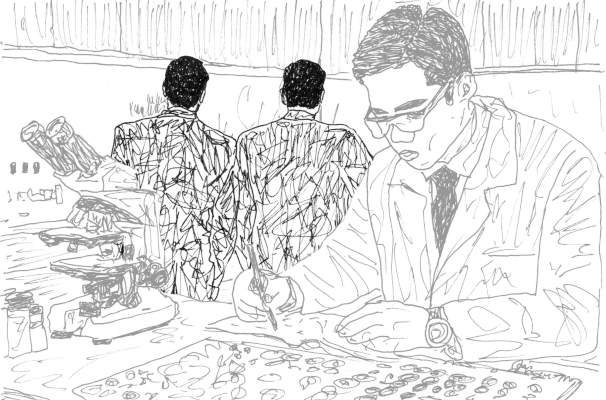 |
(Italiano) Mentre si godono una tazza di tè, i Ragazzi osservano Takumi e i suoi colleghi al lavoro nel laboratorio di alghe. Heinz è preoccupato per la goffaggine di Helmut e diventa eccessivamente cauto. Ma Helmut è solo curioso! |
(Deutsch) Während sie genüsslich einen Tee zu sich nehmen, beobachten die Jungs Takumi und seine Kollegen bei der emsigen Arbeit im Algenlabor. Heinz macht sich Sorgen wegen Helmuts Tollpatschigkeit und wird übervorsichtig. Dabei ist Helmut doch nur neugierig! Normal Version | ||
Tag 4 1 Heinz: Komm, wir setzen uns unauffällig da neben die Kanister! Auf die Bank. |
Day 4 Heinz: Come on, let's sit down discreetly next to the canisters! On the bench. |
Gai savoir Jour 4 Heinz : Viens, on va s'asseoir discrètement là, à côté des bidons ! Sur le banc. |
Gaia scienza Giorno 4 Heinz: Dai, sediamoci vicino ai bidoncini in modo non vistoso! Sulla panchina. |
Ciencia jovial Día 4 Heinz: ¡Venga, vamos a sentarnos discretamente allí, junto a los bidones! En el banco. |
2 Helmut: Nach meinen Berechnungen wird er in Kürze einen Durchbruch haben. |
Helmut: According to my calculations, he'll have a breakthrough soon. |
Helmut : D'après mes calculs, il va bientôt faire une percée. |
Helmut: Secondo i miei calcoli, presto avrà una svolta. |
Helmut: Según mis cálculos, pronto tendrá un gran avance. |
3 Heinz: Sag mal, willst du Takumi jetzt eigentlich die ganze Zeit am Rockzipfel hängen oder wie hast du dir das vorgestellt? |
Heinz: Tell me, do you want to hang on Takumi's coat-tails all the time now, or what did you have in mind? |
Heinz : Dis-moi, tu vas rester accroché à Takumi tout le temps maintenant ou comment t'imagines-tu ? |
Heinz: Dimmi, vuoi stare sempre sulla scia di Takumi d'ora in poi o come te lo sei immaginato? |
Heinz: Dime, ¿quieres ir siempre a remolque de Takumi a partir de ahora o qué tenías en mente? |
4 Heinz: Ich würde aber gern ein paar Sachen in Tokio sehen. Sashimono, Kintsugi ... |
Heinz: But I'd like to see a few things in Tokyo. Sashimono, Kintsugi... |
Heinz : Mais j'aimerais bien voir quelques petites choses à Tokyo. Sashimono, Kintsugi... |
Heinz: Ma vorrei vedere alcune cose a Tokyo. Sashimono, Kintsugi... |
Heinz: Pero me gustaría ver algunas cosas en Tokio. Sashimono, Kintsugi... |
5 Helmut: Da siehst du mehr als ich. Ha, Takumi ist voll absorbiert. Er klebt wie gebannt an seinem Mikroskop. Knack. Oh. |
Helmut: Then you see more than I do. Ha, Takumi is fully absorbed. He's glued to his microscope. Crack. Oh. |
Helmut : Alors tu vois plus que moi. Ha, Takumi est complètement absorbé. Il est collé à son microscope. Craque. Oh. |
Helmut: Allora vedi più di me. Ha, Takumi è completamente assorbito. È incollato al suo microscopio. Crac. Oh. |
Helmut: Entonces ves más que yo. Ja, Takumi está totalmente absorto. Está pegado a su microscopio. Crac. Oh. |
6 Heinz: Du hast den halben Tisch abgeräumt! Erst mal das Mikroskop aus der Pfütze heben. Uff, ist das schwer! Hoffentlich ist es heil geblieben. |
Heinz: You've swept half the table clean! Let's first lift the microscope out of the puddle. Whew, that's heavy! I hope it stayed intact. |
Heinz : Tu as renversé la moitié de la table ! Il faut d'abord sortir le microscope de la flaque d'eau. Ouf, c'est lourd ! J'espère qu'il est resté intact. |
Heinz: Hai rovesciato mezzo tavolo! Prima dobbiamo tirare fuori il microscopio dalla pozzanghera. Uff, è pesante! Spero che sia ancora intatto. |
Heinz: ¡Has despejado media mesa! Primero tenemos que sacar el microscopio del charco. Uf, ¡qué pesado! Espero que siga intacto. |
7 Helmut: Aha, Takumi nimmt die neue Probe und legt sie wieder unter das Mikroskop. Das nenn ich fröhliche Wissenschaft! |
Helmut: I see, Takumi takes the new sample and puts it under the microscope again. That's what I call joyous science! |
Helmut : Ah bon, Takumi prend le nouvel échantillon et le place à nouveau sous le microscope. C'est ce que j'appelle du gai savoir ! |
Helmut: Bene, Takumi prende il nuovo campione e lo mette di nuovo al microscopio. Questa sì che è gaia scienza! |
Helmut: Bueno, Takumi coge la nueva muestra y la vuelve a poner bajo el microscopio. ¡Eso sí que es ciencia jovial! |
(English) An eventful day comes to an end and Helmut is glad to finally get to bed. The only problem is that he has to share a room with Heinz, who is wide awake and has lots of questions as he begins to understand what is going on around him. |
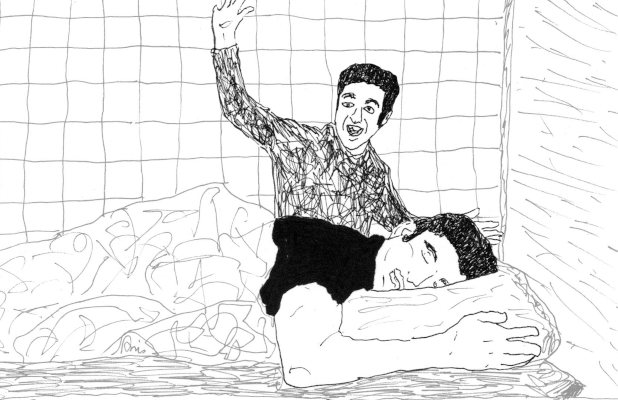 |
(Italiano) Una giornata movimentata volge al termine e Helmut è felice di andare finalmente a letto. L'unico problema è che deve dividere la stanza con Heinz, che è ben sveglio e ha un sacco di domande da fare per capire cosa sta succedendo intorno a lui. |
(Deutsch) Ein ereignisreicher Tag geht zu Ende und Helmut ist froh, endlich ins Bett zu kommen. Problematisch ist nur, dass er sich ein Zimmer mit Heinz teilen muss, der hellwach ist und viele Fragen hat, weil er zu verstehen beginnt, was um ihn herum geschieht. Normal Version | ||
Tag 4 1 Helmut: Jetzt merk ich die Anstrengungen der letzten zwei Tage. Gähn. Bin ich kaputt! |
Day 4 Helmut: Now I feel the strain of the last two days. Yawn. I'm wiped out! |
Jour 4 Helmut : Maintenant, je sens les efforts des deux derniers jours. Baille. Je suis crevé ! |
Giorno 4 Helmut: Ora mi rendo conto dello sforzo degli ultimi due giorni. Sbadiglio. Sono distrutto! |
Día 4 Helmut: Ahora me doy cuenta del esfuerzo de los dos últimos días. Bostezo. Estoy agotado. |
2 Heinz: Das ist Grundlagenforschung. Vielleicht helfen seine Ergebnisse in der Energiefrage. Algen als Treibstoff. Man macht auch Nahrung daraus, das ist bekannt, auch Medikamente, aber wusstest du, dass man aus Algen sogar Kleidungsstücke herstellen kann? Und Dünger. |
Heinz: It's basic research. Perhaps his results will help with the energy issue. Algae as fuel. It's also used to make food, that's well known, and medicines, but did you know that you can even make clothes from algae? And fertilizer. |
Heinz : C'est de la recherche fondamentale. Peut-être que ses résultats aideront à résoudre le problème de l'énergie. Les algues comme carburant. On les utilise aussi pour fabriquer des aliments, c'est bien connu, et des médicaments, mais savais-tu que l'on peut même fabriquer des vêtements à partir d'algues ? Et de l'engrais. |
Heinz: È una ricerca di base. Forse i suoi risultati saranno utili per risolvere il problema dell'energia. Le alghe come combustibile. Si usano anche per produrre cibo, questo è risaputo, e medicine, ma sapevi che dalle alghe si possono fare anche i vestiti? E fertilizzanti. |
Heinz: Eso es investigación básica. Quizá sus resultados ayuden en el tema de la energía. Las algas como combustible. También se utilizan para fabricar alimentos, eso es bien sabido, y medicinas, pero ¿sabías que incluso se puede fabricar ropa con algas? Y fertilizante. |
3 Heinz: Jetzt versteh ich übrigens auch, warum ich immer dabei sein soll. Du sagtest ja, dass es ohne mich nicht geht und alles. Meine Übervorsichtigkeit vorhin ... Das gehört alles zur Dynamik! |
Heinz: By the way, now I also understand why I should always be present. You said it wouldn't work without me and everything. My overcautiousness earlier... It's all part of the dynamic! |
Heinz : Au fait, maintenant je comprends aussi pourquoi je dois toujours être présent. Tu as dit que ça ne marcherait pas sans moi et tout. Mon excès de prudence tout à l'heure... Tout cela fait partie de la dynamique ! |
Heinz: A proposito, ora capisco anche perché dovrei essere sempre presente. Hai detto che non avrebbe funzionato senza di me e tutto il resto. La mia eccessiva prudenza di prima... Fa tutto parte della dinamica! |
Heinz: Por cierto, ahora también entiendo por qué debería estar siempre presente. Dijiste que no funcionaría sin mí y todo eso. Mi exceso de cautela de antes... ¡Todo forma parte de la dinámica! |
4 Helmut: Schmatz gnja ch |
Helmut: Smack gnya kh |
Helmut : Smg gnia kh |
Helmut: Biasc gnia kh |
Helmut: Smg gña kh |
5 Heinz: Flapp!! Mist! |
Heinz: Flapp!! Damn! |
Heinz : Vlan !! Zut ! |
Heinz: Flapp!! Accidenti! |
Heinz: ¡¡Flapp!! ¡Rayos! |
6 Heinz: Ach so, Entschuldigung! Du hast völlig recht. Aber ... nur mal kurz: Wenn ich mir die Mücke einbilde, dann hat sie wahrscheinlich auch eine Bedeutung. So wie die Lagune. |
Heinz: Oh, excuse me! You're absolutely right. But... just briefly: if I'm imagining the mosquito, then it probably has a meaning too. Just like the lagoon. |
Heinz : Ah oui, pardon ! Tu as tout à fait raison. Mais... juste un petit mot : si j'imagine le moustique, c'est qu'il a probablement une signification aussi. Tout comme le lagon. |
Heinz: Oh sì, scusa! Hai assolutamente ragione. Ma... brevemente: se sto immaginando la zanzara, allora probabilmente ha anche un significato. Proprio come la laguna. |
Heinz: ¡Ah, sí, perdona! Tienes toda la razón. Pero... sólo brevemente: si me estoy imaginando el mosquito, probablemente también tenga un significado. Igual que la laguna. |
(English) After a few days, Heinz and Helmut have their first opportunity to explore the city alone and without their protégé. Helmut is inspired by the view of the famous Shibuya Crossing and gets carried away with some nonsense. |
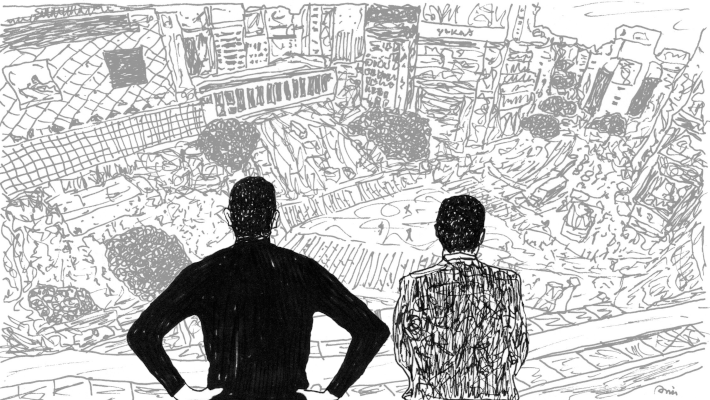 |
(Italiano) Dopo qualche giorno, Heinz e Helmut hanno la prima opportunità di esplorare la città da soli e senza il loro protetto. Helmut è ispirato dalla vista del famoso incrocio di Shibuya e si lascia trasportare da alcune sciocchezze. |
(Deutsch) Nach einigen Tagen ergibt sich die erste Gelegenheit für Heinz und Helmut, allein und ohne ihren Schützling die Stadt zu erkunden. Helmut ist inspiriert von der Aussicht auf die berühmte Kreuzung Shibuya Crossing und lässt sich zu manchem Unfug hinreißen. Normal Version | ||
Tag 7 1 Helmut: Hey, was rempelt der mich so an! Scheiß-Tourist! Hä? Oh, lei è italiano? Ah, va bene, va bene. |
Day 7 Helmut: Hey, why is he bumping into me like that! Fucking tourist! Huh? Oh, lei è italiano? Ah, va bene, va bene. |
Jour 7 Helmut : Hé, pourquoi il me bouscule comme ça ! Putain de touriste ! Hein ? Oh, lei è italiano ? Ah, va bene, va bene. |
Giorno 7 Helmut: Ehi, perché mi urta così! Turista del cazzo! Eh? "Oh, lei è italiano? Ah, va bene, va bene." |
Día 7 Helmut: ¡Eh, por qué me choca así! ¡Maldito turista! ¿Eh? Oh, ¿lei è italiano? Ah, va bene, va bene. |
2 Helmut: Lass mich doch! Zwei Milliarden Menschen gehen täglich über die Shibuya-Zebrastreifen. |
Helmut: Just let me! Two billion people cross the Shibuya crosswalks every day. |
Helmut : Laisse-moi faire ! Deux milliards de personnes traversent les passages piétons de Shibuya chaque jour. |
Helmut: Lasciami fare! Due miliardi di persone attraversano le strisce pedonali di Shibuya ogni giorno. |
Helmut: ¡Déjame! Dos mil millones de personas cruzan cada día los pasos de peatones de Shibuya. |
3 Helmut: Nun hör doch mal auf damit! Hier, übrigens, ich hab was gelernt. Du wirst dich totlachen. Pass mal auf! Äh ... ah, da. Komm mal mit! |
Helmut: Now stop that! Oh, by the way, I've learned something. You'll laugh your ass off. Watch out! Uh... ah, there. Follow me! |
Helmut : Arrête ça ! Oh, au fait, j'ai appris quelque chose. Tu vas mourir de rire. Attention ! Euh... ah, là. Suis-moi ! |
Helmut: Ora smettila! Oh, a proposito, ho imparato qualcosa. Ti farà ridere a crepapelle. Attenzione! Uh... ah, ecco. Seguimi! |
Helmut: ¡Ya basta! Oh, por cierto, he aprendido algo. Te vas a morir de risa. ¡Cuidado! Eh... ah, ahí. ¡Sígueme! |
4 Heinz: Ich weiß, ich war dabei. Das war schräg. Ich hab immer nur die Reaktion gesehen und dachte, die Leute ekeln sich vor uns oder sind krank. Ein paar sind ja auch auf den Boden gefallen. |
Heinz: I know, I was there. That was weird. I only ever saw the reaction and thought people were disgusted by us or sick. Some of them even fell on the floor. |
Heinz : Je sais, j'étais là. C'était bizarre. Je ne voyais que les réactions et j'ai pensé que les gens étaient dégoûtés par nous ou malades. Certains sont même tombés par terre. |
Heinz: Lo so, ero lì. È stato strano. Ho visto solo la reazione e ho pensato che la gente fosse disgustata da noi o malata. Alcuni sono persino caduti per terra. |
Heinz: Lo sé, yo estaba allí. Fue raro. Sólo vi la reacción y pensé que la gente nos tenía asco o estaba enferma. Algunos incluso se cayeron al suelo. |
5 Helmut: Er sprüht wie eine Wunderkerze. Glaubst du, Maria wird unter meinen Fittelichen auch so gut gedeihen? Fichterlingen? Fichten? Fittichen! Jetzt hab ich's. |
Helmut: He lights up like a sparkler. Do you think Maria will thrive as well under my tootaglitch? Tugetitch? Litch? Tutelage! Now I've got it. |
Helmut : Il pétille comme un cierge magique. Penses-tu que Maria s'épanouira aussi bien sous mon il? Elle? Aile ! Maintenant, je l'ai. |
Helmut: Si illumina come una candela magica. Credi che Maria possa crescere altrettanto bene sotto lamiala? Malala? Milaiamaia? La mia ala! Ora ce l'ho. |
Helmut: Se ilumina como una bengala. ¿Crees que María prosperará también bajo mi tuleta? ¿Tetula? ¿Teluta? ¡Tutela! Ya la tengo. |
6 Helmut: Ja. Hey, Speiseautomaten! Hier, kuck, die ganze Gasse entlang! Los, lass uns das ausprobieren! |
Helmut: Yes. Hey, vending machines! Here, look, all along the alley! Come on, let's try it out! |
Helmut : Oui. Hé, des distributeurs automatiques ! Ici, regarde, tout au long de la ruelle ! Viens, on va essayer ! |
Helmut: Sì. Ehi, distributori automatici! Qui, guarda, lungo tutto il vicolo! Dai, proviamoli! |
Helmut: Sí. ¡Eh, máquinas expendedoras! Aquí, mira, ¡a lo largo de todo el callejón! Venga, ¡a probar! |
7 Heinz: Was ist das? |
Heinz: What is it? |
Heinz : Qu'est-ce que c'est ? |
Heinz: Che cos'è? |
Heinz: ¿Qué es eso? |
(English) Japan is known for its special way of life and innovative strength. During a visit to a supermarket, the Boys realize that both of them have already thought about this topic. Helmut asks the sales clerk what she, as a local, has to say about it. |
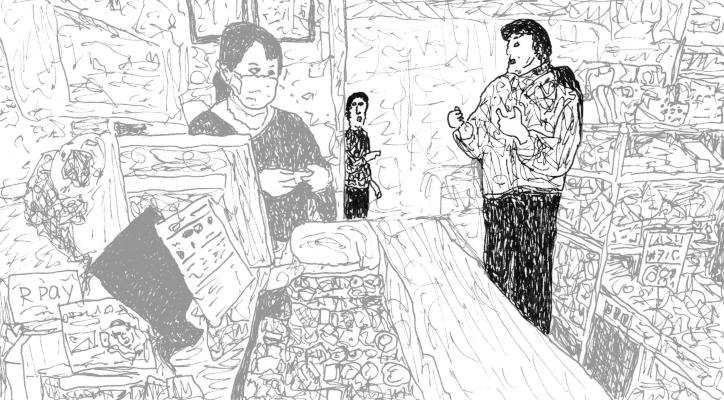 |
(Italiano) Il Giappone è noto per il suo particolare stile di vita e per la sua forza innovativa. Quando i Ragazzi visitano un supermercato, si rendono conto che entrambi hanno già pensato a questo argomento. Helmut chiede alla commessa cosa ne pensa lei, che è del posto. |
(Deutsch) Japan ist bekannt für seine besondere Lebensart und Innovationskraft. Die Jungs stellen beim Besuch eines Supermarkts fest, dass sie sich beide bereits Gedanken zu diesem Thema gemacht haben. Helmut fragt die Verkäuferin, was sie als Einheimische dazu sagt. Normal Version | ||
Tag 7 Helmut: Und was soll ich jetzt damit machen? Nimmst du die? |
Day 7 Helmut: And what am I supposed to do with this now? Can you take it? |
Jour 7 Helmut : Et qu'est-ce que je suis censé faire avec ça maintenant ? Tu peux le prendre ? |
Giorno 7 Helmut: E cosa dovrei fare con questo adesso? Puoi prenderlo? |
Día 7 Helmut: ¿Y qué se supone que tengo que hacer con esto ahora? ¿Te lo llevas? |
2 Helmut: Gehen wir jetzt weiter oder was? |
Helmut: Are we marching on now or what? |
Helmut : On continue à marcher ou quoi ? |
Helmut: Continuiamo a camminare adesso o cosa? |
Helmut: ¿Seguimos adelante ahora o qué? |
3 Heinz: Ich glaube, langsam versteh ich, worum es bei der japanischen Lebensart geht. |
Heinz: I think I'm beginning to understand what the Japanese way of life is all about. |
Heinz : Je crois que je commence à comprendre ce qu'est le mode de vie japonais. |
Heinz: Credo di iniziare a capire cosa significhi lo stile di vita giapponese. |
Heinz: Creo que empiezo a comprender el modo de vida japonés. |
4 Heinz: Rituale werden auch dadurch zu Traditionen, dass man sie nicht mehr hinterfragt. Wenn aber das Hinterfragen von Anfang an Teil des Rituals ist, kommt man nicht drumherum. Das führt in Japan immer wieder zu Innovation. |
Heinz: One reason why rituals become traditions is that they are no longer questioned. But if questioning is part of the ritual from the outset, you can't avoid it. In Japan, this is what constantly leads to innovation. |
Heinz : L'une des raisons pour lesquelles les rituels deviennent des traditions, c'est qu'ils ne sont plus remis en question. Mais si la remise en question fait partie du rituel dès le départ, tu ne peux pas l'éviter. Au Japon, c'est ce qui conduit constamment à l'innovation. |
Heinz: Uno dei motivi per cui i rituali diventano tradizioni è che non vengono più messi in discussione. Ma se la messa in discussione fa parte del rituale fin dall'inizio, non si può evitare. In Giappone, questo è ciò che porta costantemente all'innovazione. |
Heinz: Una de las razones por las que los rituales se convierten en tradiciones es que ya no se cuestionan. Pero si el cuestionamiento es parte del ritual desde el principio, no se puede evitar. En Japón, esto es lo que conduce repetidamente a la innovación. |
5 Heinz: Da ist was dran. Nun denn ... Aha, Obst und Gemüse. |
Heinz: That's a point. Well then... I see, fruit and vegetables. |
Heinz : C'est pas faux. Eh bien... Ah, des fruits et des légumes. |
Heinz: Direi che ha senso. Quindi...Ah, frutta e verdura. |
Heinz: Tiene sentido. Bueno, entonces... Ya veo, frutas y verduras. |
6 Heinz: Seufz. OK, also, was hat sie erzählt? |
Heinz: Sigh. OK, so what did she say? |
Heinz : Soupir. Bon, alors qu'est-ce qu'elle a raconté ? |
Heinz: Sigh. Ok, allora cosa ha detto? |
Heinz: Suspiro. Vale, ¿y qué dijo ella? |
7 Helmut: Das Streben ... warte mal, der Gedanke entschlüpft mir gerade. Worüber hatten wir noch mal gesprochen? |
Helmut: Striving for... wait a minute, the thought just slipped out of my head. What were we talking about? |
Helmut : La quête de... attends, la pensée m'échappe. De quoi parlions-nous déjà ? |
Helmut: La ricerca dell... aspetta, mi è sfuggito il pensiero. Di cosa stavamo parlando? |
Helmut: La búsqueda del... espera un momento, se me está escapando el pensamiento. ¿De qué estábamos hablando? |
(English) Heinz and Helmut have returned from their extended stroll through the city and turn their attention back to Takumi. The latter is deeply immersed in his work and goes through phases that are not always understandable to those around him. |
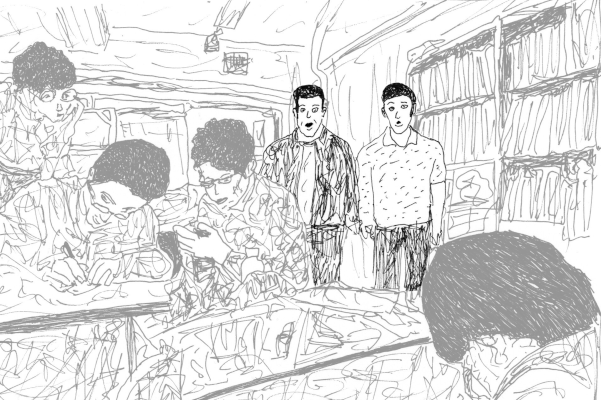 |
(Italiano) Heinz e Helmut sono tornati dalla loro lunga passeggiata in città e rivolgono la loro attenzione a Takumi. Egli è profondamente immerso nel suo lavoro e attraversa fasi non sempre comprensibili alle persone che lo circondano. |
(Deutsch) Heinz und Helmut sind von ihrem ausgedehnten Stadtbummel zurückgekehrt und wenden sich wieder Takumi zu. Der ist tief in seine Arbeit versunken und durchlebt dabei Phasen, die für die Außenstehenden nicht immer verständlich sind. Normal Version | ||
Tag 7 Helmut: Wenn man aus Algen einen Plastikersatz machen könnte, das wär was! |
Day 7 Helmut: If one could make a plastic substitute out of algae, that would be something! |
pétille Jour 7 Helmut : Si les algues pouvaient être utilisées pour remplacer le plastique, ce serait quelque chose ! |
brilla Giorno 7 Helmut: Se le alghe potessero essere utilizzate per sostituire la plastica, sarebbe già qualcosa! |
echa chispas Día 7 Helmut: ¡Si se pudieran utilizar algas para sustituir al plástico, ya sería algo! |
2 Heinz: In den letzten Tagen hat er offenbar keinen Leibwächter gebraucht. |
Heinz: He obviously hasn't needed a bodyguard in the last few days. |
Heinz : Apparemment, il n'a pas eu besoin de garde du corps ces derniers jours. |
Heinz: A quanto pare non ha avuto bisogno di una guardia del corpo negli ultimi giorni. |
Heinz: Parece que no ha necesitado guardaespaldas en los últimos días. |
3 Helmut: Oder letztens, als wir uns Essen ins Haus bestellt hatten anstatt auszugehen. |
Helmut: Or the other day, when we ordered food into the house instead of going out. |
Helmut : Ou l'autre jour, quand nous avons commandé de la nourriture à la maison au lieu de sortir. |
Helmut: O l'altro giorno, quando abbiamo ordinato del cibo in casa invece di uscire. |
Helmut: O el otro día, cuando pedimos comida a casa en lugar de salir. |
4 Helmut: (...) Takumi! Was tust du denn da? |
Helmut: (...) Takumi! What are you doing there? |
Helmut : (...) Takumi ! Mais qu'est-ce que tu fais là ? |
Helmut: (...) Takumi! Ma cosa ci fai lì? |
Helmut: (...) ¡Takumi! ¿Qué estás haciendo ahí? |
5 Heinz: OK, dann ist Takumi also nicht durchgedreht. Das ist ja schon mal was. Ist er in Gefahr? Spürst du irgendwas? |
Heinz: OK, so Takumi hasn't gone mad. That's something. Is he in danger? Do you feel anything? |
Heinz : OK, alors Takumi n'est pas devenu fou. C'est déjà ça. Est-il en danger ? Tu sens quelque chose ? |
Heinz: Ok, quindi Takumi non è impazzito. È già qualcosa. È in pericolo? Senti qualcosa? |
Heinz: Vale, entonces Takumi no se ha vuelto loco. Eso ya es algo. ¿Está en peligro? ¿Sientes algo? |
6 Heinz: Du hast Takumi hellhörig gemacht. Er hat aufgehört zu schreiben und denkt nach. |
Heinz: You've made Takumi prick up his ears. He's stopped writing and is thinking. |
Heinz : Tu as attiré l'attention de Takumi. Il a arrêté d'écrire et réfléchit. |
Heinz: Hai fatto drizzare le orecchie a Takumi. Ha smesso di scrivere e sta pensando. |
Heinz:Has hecho que Takumi aguzara el oído. Ha dejado de escribir y está pensando. |
(English) Takumi's progress has side effects. Heinz can make it clear to his friend from the visible and audible developments that from now on they will have to deal with completely new challenges when it comes to protecting the algae researcher. Helmut is overwhelmed, but Heinz has an idea. |
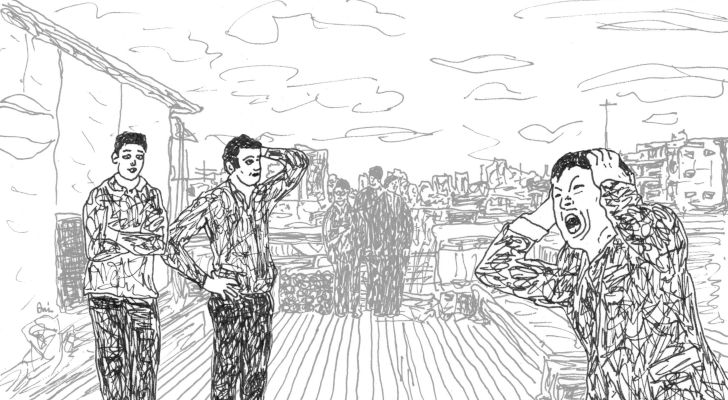 |
(Italiano) I progressi di Takumi hanno effetti collaterali. Heinz può far capire al suo amico dagli sviluppi visibili e udibili che d'ora in poi dovranno affrontare sfide completamente nuove quando si tratterà di proteggere il ricercatore di alghe. Helmut è sopraffatto, ma Heinz ha un'idea. |
(Deutsch) Takumis Fortschritte haben Nebeneffekte. Heinz kann seinem Freund anhand der sichtbaren und hörbaren Entwicklungen klarmachen, dass sie es von nun an mit ganz neuen Herausforderungen zu tun haben werden, was den Schutz des Algenforschers betrifft. Helmut ist überfordert, aber Heinz hat eine Idee. Normal Version | ||
Auf dem Dach Tag 8 1 Helmut: Ah, da bist du ja wieder! Na, erfolgreich frische Luft geschnappt? Hier, kuck mal den ... |
On the Roof Day 8 Helmut: Ah, there you are again! Did you have a successful breath of fresh air? Here, look at this... |
Sur le toit Jour 8 Helmut : Ah, te revoilà ! Alors, tu as réussi à prendre une bonne bouffée d'air frais ? Tiens, regarde ça... |
Sul tetto Giorno 8 Helmut: Ah, eccoti di nuovo! Hai preso una bella boccata d'aria fresca? Ecco, guarda qui... |
En el tejado Día 8 Helmut: ¡Ah, ahí estás otra vez! ¿Te ha dado un buen soplo de aire fresco? Mira el... |
2 Heinz: Ich werd's mir merken. Also, was ich dir sagen will ... |
Heinz: I'll keep that in mind. Now, what I want to tell you... |
Heinz : Je m'en souviendrai. Alors, ce que je veux te dire... |
Heinz: Lo terrò a mente. Allora, quello che voglio dirti... |
Heinz: Lo tendré en cuenta. Entonces, lo que quiero decirte es... |
3 Helmut: Wie konnte das passieren? Ääh, jetzt hab ich vor Schreck auch noch den Tee verschüttet! |
Helmut: How could that happen? Erm, now I've spilled my tea from the shock! |
Helmut : Comment cela a-t-il pu arriver ? Erm, j'ai renversé mon thé maintenant sous le choc ! |
Helmut: Come è potuto succedere? Eeh, ho rovesciato il tè per lo shock! |
Helmut: ¿Cómo ha podido pasar eso? ¡Ejem, ahora he derramado el té por el susto! |
4 Heinz: Anscheinend. Hoffentlich gibt das keinen Ärger! Darf man das hier überhaupt? Schreien? |
Heinz: Apparently. I hope it won't cause any trouble! Is that even allowed here? Screaming? |
Heinz : Apparemment. J'espère qu'il ne causera pas d'ennuis ! Est-ce qu'on a le droit de faire ça ici pour commencer ? Gueuler? |
Heinz: A quanto pare. Spero che non crei problemi! È permesso fare queste cose qui? Gridare? |
Heinz: Al parecer. ¡Espero que no cause ningún problema! ¿Está siquiera permitido hacer eso aquí? ¿Gritar? |
5 Helmut: Takumi, my friend! |
Helmut: Takumi, my friend! |
Helmut : Takumi, my friend ! |
Helmut: Takumi, my friend! |
Helmut: ¡Takumi, my friend! |
6 Heinz: Ah! Aber warum hast du im Voraus nichts gespürt? Äh, Moment! OK, Leute, geht schon mal wieder runter, wir kommen gleich nach! Yes. |
Heinz: Ah! But why didn't you sense anything in advance? Uh, wait a minute! OK, guys, go back downstairs, we'll be right there! Yes. |
Heinz : Ah ! Mais pourquoi n'as-tu rien senti à l'avance ? Euh, attends ! OK, les gars, redescendez déjà, nous vous rejoignons tout de suite ! Yes. |
Heinz: Ah! Ma perché non hai percepito nulla in anticipo? Ehm, aspetta! Ok, ragazzi, tornate di sotto, arriviamo subito! Yes. |
Heinz: ¡Ah! Pero, ¿por qué no te diste cuenta de nada antes? ¡Eh, espera! Vale, chicos, volved abajo, ¡ahora mismo vamos! Yes. |
7 Helmut: Also nee, das ... nee, das kann ich nicht. Wie soll das überhaupt gehen? |
Helmut: Oh no, that... no, I can't do that. How is that even possible? |
Helmut : Eh bien non, ça... non, je ne peux pas faire ça. Comment veux-tu que ça marche ? |
Helmut: Beh, no, questo... no, non posso farlo. Come pensi che possa funzionare? |
Helmut: Bueno, no, eso... no, no puedo hacerlo. ¿Cómo crees que funcionaría? |
8 Helmut: Woher weißt du das eigentlich so genau? |
Helmut: And how do you know this so well? |
Helmut : Et comment le sais-tu si bien ? |
Helmut: E come fai a saperlo così bene? |
Helmut: ¿Y cómo sabes esto tan bien? |
(English) Heinz feels called upon to lead the situation for a while and calls the group together for a discussion in the living room. Together, the six of them work out a strategy to reach a successful conclusion. |
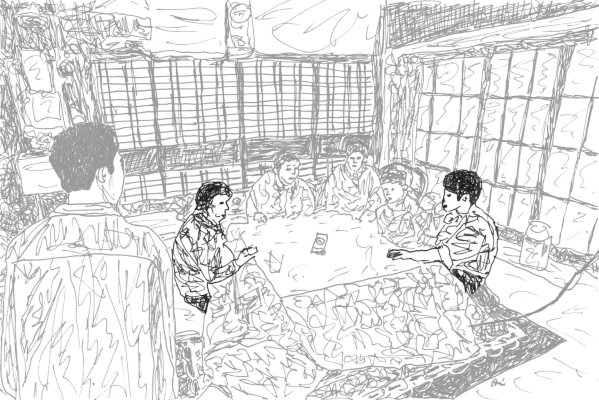 |
(Italiano) Heinz si sente chiamato a dirigere la situazione per un po' e convoca il gruppo per una discussione in salotto. Insieme, i sei elaborano una strategia per raggiungere una conclusione di successo. |
(Deutsch) Heinz sieht sich berufen, die Situation für eine Weile zu führen, und er ruft die Gruppe zu einem Gespräch im Wohnzimmer zusammen. Gemeinsam erarbeiten die sechs eine Strategie, um zu einem erfolgreichen Abschluss zu gelangen. Normal Version | ||
Tag 8 1 Heinz: Klopf, klopf. Hallo Takumi, ich komm dich abholen. Die anderen sitzen alle schon im Wohnzimmer. Ja, ich weiß, dass du beschäftigt bist. Aber lass den Stift mal für einen Moment ruhen, bitte! |
Day 8 Heinz: Knock, knock. Hello Takumi, I'm coming to pick you up. The others are already in the living room. Yes, I know you're busy. But let the pen rest for a moment, please! |
Jour 8 Heinz : Toc, toc. Salut Takumi, je viens te chercher. Les autres sont déjà dans le salon. Oui, je sais que tu es occupé. Mais laisse le stylo se reposer un moment, s'il te plaît ! |
Giorno 8 Heinz: Toc, toc. Ciao Takumi, sto venendo a prenderti. Gli altri sono già in salotto. Sì, so che sei impegnato. Ma lascia riposare la penna per un momento, per favore! |
Día 8 Heinz: Toc, toc. Hola, Takumi, he venido a recogerte. Los demás ya están en el salón. Sí, sé que estás ocupado. Pero deja descansar tu bolígrafo un momento, ¡por favor! |
2 Helmut: Ah, Takumi, hier ist ein Platz für dich. Setz dich neben mich! |
Helmut: Ah, Takumi, there's a place for you here. Sit next to me! |
Helmut : Ah, Takumi, il y a une place pour toi ici. Assieds-toi à côté de moi ! |
Helmut: Ah, Takumi, c'è un posto per te qui. Siediti accanto a me! |
Helmut: Ah, Takumi, aquí hay un sitio para ti. ¡Siéntate a mi lado! |
3 Heinz: OK, du sagst also: pünktliche Abgabe eines erstklassigen Artikels bei äh ... Unversehrtheit. Ah, bei guter Gesundheit. Helmut, hör mal auf, an dem Übersetzer rumzufummeln! |
Heinz: OK, so you're saying: on-time delivery of a first-class article in, uh... integrity. Ah, in good health. Helmut, stop fiddling with the translator, will you! |
Heinz : OK, donc tu dis : livraison à temps d'un article de première classe avec, euh... l'intégrité. Ah, en bonne santé. Helmut, arrête de tripoter le traducteur, tu veux bien ! |
Heinz: Ok, quindi tu dici: consegna puntuale di un articolo di prima classe con, ehm... integrità. Ah, in buona salute. Helmut, smetti di armeggiare con il traduttore! |
Heinz: Vale, entonces estás diciendo: entrega a tiempo de un artículo de primera clase en, eh... integridad. Ah, en buena salud. Helmut, ¡deja de juguetear con el traductor, por favor! |
4 Helmut: Ja, und wir wollen dir dabei helfen. Wir wissen bloß noch nicht, wie. Was? Doch! Doch, wir sind auf dem Weg, aber wir brauchen noch ein bisschen Zeit. |
Helmut: Yes, and we want to help you with that. We just don't know how yet. What? We do! Yes, we're on our way, but we still need a little more time. |
Helmut : Oui, et nous voulons t'aider à le faire. Mais nous ne savons pas encore comment. Quoi ? Si ! Si, nous sommes sur la bonne voie, mais il nous faut encore un peu de temps. |
Helmut: Sì, e noi vogliamo aiutarti a farlo. Solo che non sappiamo ancora come. Cosa? Sì! Sì, siamo sulla strada giusta, ma ci serve ancora un po' di tempo. |
Helmut: Sí, y queremos ayudarte con eso. Es solo que aún no sabemos cómo. ¿Qué? ¡Sí! Sí, estamos en camino, pero aún necesitamos un poco más de tiempo. |
5 Heinz: Ja nee, die Frage ist schon berechtigt. Hm. Stellt euch einfach vor, dass Takumi fünf Jahre jünger ist als ihr und nicht zwei Jahre älter. |
Heinz: Yeah no, that's a fair question actually. Hm. Just imagine that Takumi is five years younger than you and not two years older. |
Heinz : Oui non, c'est une bonne question en fait. Hm. Imaginez que Takumi ait cinq ans de moins que vous et non pas deux ans de plus. |
Heinz: Sì, no, è una domanda giusta. Hm. Immaginate che Takumi abbia cinque anni in meno di voi e non due in più. |
Heinz: Sí, no, en realidad es una pregunta justa. Hm. Imaginad que Takumi es cinco años más joven que vosotros y no dos años mayor. |
6 Helmut: Sicher, sicher. Wessen Fuß ist das da eigentlich? |
Helmut: Sure, sure. Whose foot is that actually? |
Helmut : Bien sûr, bien sûr. C'est le pied de qui en fait, là ? |
Helmut: Certo, certo. Di chi è quel piede, del resto? |
Helmut: Claro, claro. Por cierto, ¿de quién es ese pie? |
(English) Heinz has chosen an unusual place for the evening meeting. Helmut is not enthusiastic. However, the main thing is that the two of them make progress, and that is definitely the case, because they find out a secret about Helmut's blue ring. |
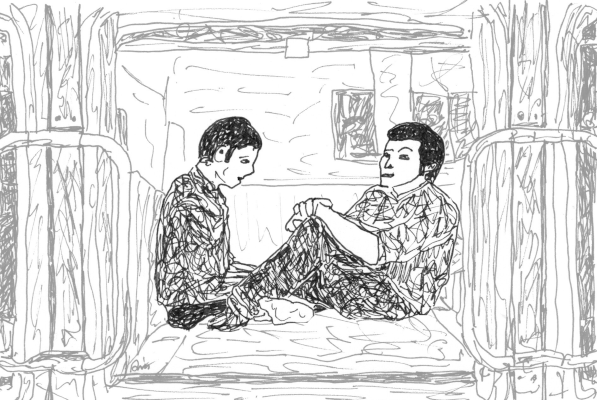 |
(Italiano) Heinz ha scelto un luogo insolito per l'incontro serale. Helmut non è impressionato. Ma l'importante è che i due facciano progressi, e questo è sicuramente il caso, perché scoprono un segreto sull'anello blu di Helmut. |
(Deutsch) Einen ungewöhnlichen Ort für die abendliche Besprechung hat sich Heinz da ausgesucht. Helmut ist nicht begeistert. Die Hauptsache aber ist, dass die beiden einen Schritt weiterkommen, und das ist definitiv der Fall, denn sie finden ein Geheimnis über Helmuts blauen Ring heraus. Normal Version | ||
Tag 8 1 Heinz: Sehr schön! Am besten fangen wir mit der Analyse der Supermarktszene an. Kannst du deinen Rucksack bitte auf die andere Seite legen? |
Day 8 Heinz: Very nice! Let's start by analyzing the supermarket scene. Can you please put your backpack on the other side? |
Jour 8 Heinz : Très bien ! Commençons par analyser la scène du supermarché. Tu peux mettre ton sac à dos de l'autre côté, s'il te plaît ? |
Giorno 8 Heinz: Molto bene! Iniziamo ad analizzare la scena del supermercato. Puoi mettere il tuo zaino dall'altra parte, per favore? |
Día 8 Heinz: ¡Muy bien! Empecemos analizando la escena del supermercado. ¿Puedes poner la mochila en el otro lado, por favor? |
2 Helmut: Ach so, da. Naja, also die Tür ist nur ein Rollladen. Außerdem denken die an der Rezeption, dass wir ... |
Helmut: Ah, there. Well, the door actually is just a shutter. Besides, the guys at reception think we... |
Helmut : Ah oui, là. En fait, la porte n'est qu'un volet roulant. En plus, les gars de la réception pensent que nous... |
Helmut: Ah, lì. Beh, la porta in realtà è solo una persiana. Inoltre, i ragazzi alla reception pensano che... noi |
Helmut: Ah, allí. Bueno, la puerta en realidad es solo una persiana. Además, los chicos de recepción creen que nosotros... |
3 Helmut: Du hast auf die Ananas gezeigt, dann hab ich dich gefragt, ob du was kaufen willst. |
Helmut: You pointed at the pineapple, then I asked you if you wanted to buy something. |
Helmut : Tu as pointé du doigt l'ananas, puis je t'ai demandé si tu voulais acheter quelque chose. |
Helmut: Hai indicato l'ananas, poi ti ho chiesto se volevi comprare qualcosa. |
Helmut: Tú señalaste la piña, luego te pregunté si querías comprar algo. |
4 Heinz: Hm. Und dann? |
Heinz: Hm. And then? |
Heinz : Hm. Et ensuite ? |
Heinz: Hm. E poi? |
Heinz: Hm. ¿Y luego? |
5 Heinz: Immerhin konntest du dich zunächst kurz erinnern und hast diese Sache gesagt, dass die japanische Innovationskraft auf einer Balance der zwei Gesichter beruht. |
Heinz: At least you were able to remember things briefly at first and said that Japan's capacity for innovation is based on a balance between the two faces. |
Heinz : Au moins, tu as pu te rappeler brièvement au début et tu as dit cette chose, à savoir que la force d'innovation japonaise repose sur un équilibre des deux faces. |
Heinz: Almeno ti sei ricordato brevemente all'inizio e hai detto questa cosa, che la forza innovativa giapponese si basa sull'equilibrio delle due facce. |
Heinz: Al menos pudiste recordar cosas brevemente al principio y dijiste que el poder innovador japonés se basa en el equilibrio de las dos caras. |
6 Heinz: Wir können annehmen, dass es sich bei dem Geist um einen Japaner handelt. Mehr wissen wir nicht. |
Heinz: We can assume that the ghost is Japanese. But that's all we know. |
Heinz : Nous pouvons supposer que le fantôme est un Japonais. Mais c'est tout ce que nous savons. |
Heinz: Possiamo supporre che il fantasma sia giapponese. Ma è tutto ciò che sappiamo. |
Heinz: Podemos suponer que el fantasma es japonés. Pero eso es todo lo que sabemos. |
(English) Heinz and Helmut do indeed succeed in making contact with the spirit whose existence they had already suspected. Heinz learns astonishing details about a man who lived in Tokyo when it was still called Edo. And about his ill-fated son. |
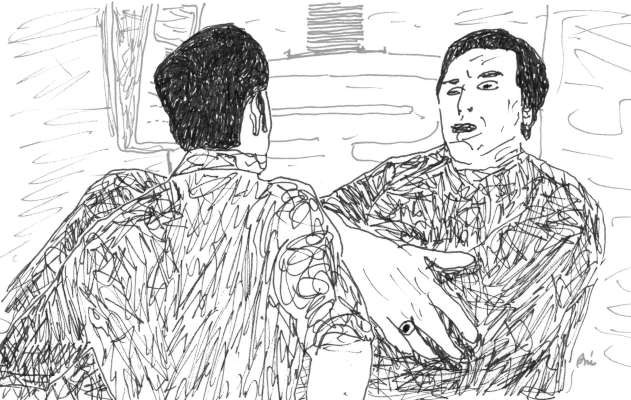 |
(Italiano) Heinz e Helmut riescono a entrare in contatto con lo spirito di cui avevano già sospettato l'esistenza. Heinz apprende dettagli sorprendenti su un uomo vissuto a Tokyo quando ancora si chiamava Edo. E sul suo sfortunato figlio. |
(Deutsch) Tatsächlich gelingt es Heinz und Helmut, Kontakt zu dem Geist aufzunehmen, dessen Existenz sie bereits geahnt haben. Heinz erfährt erstaunliche Details über einen Mann, der in Tokio gelebt hat, als es noch den Namen Edo getragen hat. Und über dessen vom Schicksal gebeutelten Sohn. Normal Version | ||
Der Ahn Tag 8 1 Heinz: Und darf ich nach deinem Namen fragen? |
The Ancestor Day 8 Heinz: And may I ask your name? |
L'ancêtre Jour 8 Heinz : Et puis-je te demander ton nom ? |
L'antenato Giorno 8 Heinz: E posso chiederti il tuo nome? |
El Antepasado Día 8 Heinz: ¿Y puedo preguntarte tu nombre? |
2 Heinz: Ah, jetzt kommen wir der Sache schon näher. Könntest du mir ein bisschen Platz lassen, äh, Takumi senior? Danke. |
Heinz: Ah, now we're getting closer. Could you leave me some space, uh, Takumi senior? Thank you. |
Heinz : Ah, maintenant nous nous rapprochons du but. Tu peux me laisser un peu d'espace, euh, Takumi le père ? Merci. |
Heinz: Ah, ora ci stiamo avvicinando alla meta. Potresti lasciarmi un po' di spazio, ehm, Takumi senior? Grazie. |
Heinz: Ah, ahora nos acercamos a la meta. ¿Podrías dejarme un poco de espacio, ehm, Takumi padre? Gracias. |
3 Heinz: Sashimono?! Oh, das ... |
Heinz: Sashimono?! Oh, that... |
Heinz : Sashimono ?! Oh, ça... |
Heinz: Sashimono?! Oh, quello... |
Heinz: ¡¿Sashimono?! Oh, eso... |
4 Heinz: Was hab ich jetzt schon wieder falsch gemacht? |
Heinz: What have I done wrong this time? |
Heinz : Qu'est-ce que j'ai encore fait de mal ? |
Heinz: Cosa ho fatto di male questa volta? |
Heinz: ¿Qué he hecho mal esta vez? |
5 Heinz: Und da bist du neidisch geworden. |
Heinz: And that made you jealous. |
Heinz : Et cela t'a rendu jaloux. |
Heinz: E questo ti ha reso geloso. |
Heinz: Y eso te ponía celoso. |
6 Helmut: Ja. Ich stand direkt daneben. Ich konnte nichts tun. Die Schande lastet auf mir und ich finde keine Ruhe. |
Helmut: Yes. I was standing right next to him. There was nothing I could do. The shame weighs heavily on me and I can't find peace. |
Helmut : Oui. J'étais juste à côté. Je ne pouvais rien faire. La honte pèse sur moi et je ne trouve pas la paix. |
Helmut: Sì. Ero proprio accanto a lui. Non ho potuto fare nulla. La vergogna mi pesa molto e non riesco a trovare pace. |
Helmut: Sí. Yo estaba justo a su lado. No pude hacer nada. La vergüenza me pesa mucho y no puedo encontrar la paz. |
7 Helmut: ... wie ich deine lästige und ungehörige Fragerei beenden kann? Ja, ich glaube, das geht so: tock tock tock. Hier gibt's auch zwei Kopfhörer und eine Fernbedienung. Wir könnten später noch ein bisschen fernsehen. |
Helmut: ...how I can put an end to your annoying and inappropriate questioning? Yes, I think it goes like this: tock tock tock. There are also two headphones and a remote control here. We could watch a bit of TV later. |
Helmut : ...comment je peux mettre fin à tes questions agaçantes et déplacées ? Oui, je crois que c'est comme ça : toc toc toc. Il y a aussi deux écouteurs et une télécommande ici. On pourrait regarder un peu la télé plus tard. |
Helmut: ...come posso porre fine alle tue domande fastidiose e inappropriate? Sì, credo che funzioni così: toc toc toc. Qui ci sono anche due cuffie e un telecomando. Potremmo guardare un po' di TV più tardi. |
Helmut: ...¿cómo puedo poner fin a tus preguntas molestas e inapropiadas? Sí, creo que va así: toc, toc, toc. Aquí también hay dos auriculares y un mando a distancia. Podríamos ver un poco la tele más tarde. |
(English) Fiona is working from home because she wants to escape the oppressive atmosphere in the office. Fanni comes over for breakfast to keep her company and work with her afterwards. Neither of them suspects that this is a fateful day. |
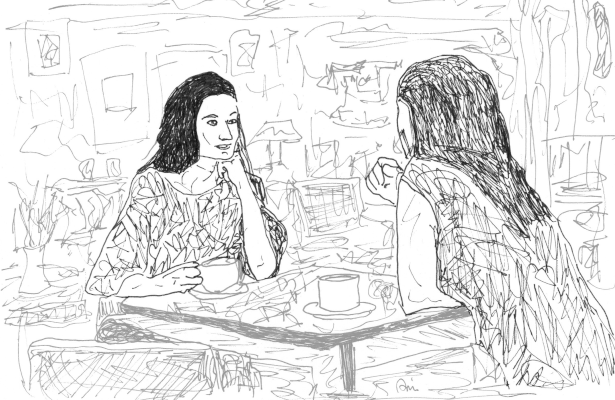 |
(Italiano) Fiona lavora da casa perché vuole sfuggire all'atmosfera opprimente dell'ufficio. Fanni viene a fare colazione per tenerle compagnia e per lavorare con lei in seguito. Nessuna delle due si rende conto che questo è un giorno fatidico. |
(Deutsch) Fiona arbeitet von zu Hause aus, denn sie will der bedrückenden Atmosphäre im Büro entfliehen. Fanni kommt zum Frühstück, um ihr Gesellschaft zu leisten und danach mit ihr zu arbeiten. Keine von beiden ahnt, dass es sich um einen schicksalhaften Tag handelt. Normal Version | ||
Tag 10 1 Fanni: Jenny lässt übrigens grüßen. |
Day 10 Fanni: Jenny sends her regards, by the way. |
Jour 10 Fanni : D'ailleurs, Jenny t'envoie ses salutations. |
Giorno 10 Fanni: Jenny ti manda i suoi saluti, a proposito. |
Día 10 Fanni: Por cierto, Jenny te envía saludos. |
2 Fiona: Schön, dass du zum Frühstück gekommen bist! Ein bisschen sozialer Kontakt. Schlürf |
Fiona: Nice of you to come to breakfast! Some social contact. Slurp |
Fiona : C'est gentil que tu sois venue au petit déjeuner ! Un peu de contact social. Slurp |
Fiona: È bello che tu sia venuta a fare colazione! Un po' di contatto sociale. Slurp |
Fiona: ¡Qué bien que hayas venido a desayunar! Un poco de contacto social. Sorp. |
3 Fiona: Es kam mir eher so vor, als hätte er etwas erlebt, das ... ♪ Wednesday morning at five o'clock as the day begins ... |
Fiona: It seemed to me more like he had experienced something that... ♪ Wednesday morning at five o'clock as the day begins... |
Fiona : J'avais plutôt l'impression qu'il avait vécu quelque chose qui... ♪ Wednesday morning at five o'clock as the day begins... |
Fiona: A me sembrava più che altro che avesse vissuto un'esperienza che... ♪ Wednesday morning at five o'clock as the day begins... |
Fiona: A mí me sonó más como si hubiera experimentado algo que... ♪ Wednesday morning at five o'clock as the day begins... |
4 Fiona: Ja. Und er hat ihr Maisun vorgestellt und sie gepriesen wie ein verliebter Marktschreier seine Kartoffeln. Er will Promofilme über die neuen Produkte machen und Maisun soll sich um die Texte in sieben Sprachen kümmern, inklusive Einsprechen im Studio. |
Fiona: Yes. And he introduced her to Maisoon and praised her like an enamored street barker praising his potatoes. He wants to make promo films about the new products and he wants Maisoon to take care of the texts in seven languages, including recording them in the studio. |
Fiona : Oui. Et il l'a présentée à Maisoun et l'a vanté comme un bonimenteur amoureux vante ses pommes de terre. Il veut faire des films promotionnels sur les nouveaux produits et Maisoun est censée s'occuper des textes en sept langues, y compris l'enregistrement en studio. |
Fiona: Sì. Le ha presentato Maisun e l'ha elogiata come un imbonitore innamorato elogia le sue patate. Vuole realizzare dei video promozionali sui nuovi prodotti e vuole che Maisoon si occupi dei testi in sette lingue, compresa la registrazione in studio. |
Fiona: Sí. Y la presentó a Maisun y la elogió como un pregonero de mercado enamorado hace con sus patatas. Quiere hacer vídeos promocionales sobre los nuevos productos y se supone que Maisun se encargará de los textos en siete idiomas, incluida la grabación en estudio. |
5 Fiona: So geht das nicht weiter, Fanni! |
Fiona: This can't go on like this, Fanni! |
Fiona : Ça ne peut pas continuer comme ça, Fanni ! |
Fiona: Non può andare avanti così, Fanni! |
Fiona: ¡Esto no puede seguir así, Fanni! |
6 Fanni: Wenn du dich strafbar machst, ist der Vertrag hinfällig und du verlierst alles. Ein Dilemma. |
Fanni: If you make yourself liable to prosecution, the contract is void and you lose everything. That's a dilemma. |
Fanni : Si tu es en infraction, le contrat est nul et tu perds tout. C'est un dilemme. |
Fanni: Se ti rendi perseguibile, il contratto è nullo e perdi tutto. Questo è un dilemma. |
Fanni: Si te haces responsable de un proceso judicial, el contrato queda anulado y lo pierdes todo. Un dilema. |
(English) Four days after their encounter with the Japanese ghost, the Boys find themselves in the lab biding their time. Everything seems to be fine and Takumi is making progress, but it turns out that it was a good idea of his to take a bodyguard with him. |
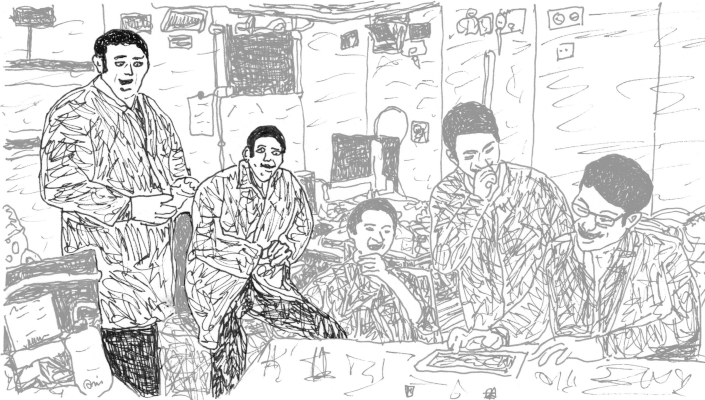 |
(Italiano) Quattro giorni dopo l'incontro con il fantasma giapponese, i Ragazzi si ritrovano in laboratorio dove passano il tempo. Tutto sembra andare bene e Takumi sta facendo progressi, ma si scopre che è stata una buona idea portarsi dietro una guardia del corpo. |
(Deutsch) Vier Tage nach ihrer Begegnung mit dem japanischen Geist finden sich die Jungs im Labor wieder, wo sie sich die Zeit vertreiben. Alles scheint in Ordnung zu sein und Takumi macht Fortschritte, doch stellt sich heraus, dass es eine gute Idee von ihm war, einen Leibwächter mitzunehmen. Normal Version | ||
Tag 12 1 Helmut: Kling. Mist, schon wieder runtergefallen! Ey, wie machst du das? Ächz, mach du noch mal! |
Day 12 Helmut: Clink. Shoot, it fell down again! Hey, how do you do that? Groan, you do it again! |
Jour 12 Helmut : Ding. Zut, elle est encore tombée ! Hé, comment tu fais ça ? Uff, tu recommences toi ! |
Giorno 12 Helmut: Tin-tin. Cavolo, è caduto di nuovo! Ehi, come fai? Uff, lo fai di nuovo! |
Día 12 Helmut: Tin-tin. Joder, ¡se ha vuelto a caer! Oye, ¿cómo lo haces? Uf, ¡Hazlo tú otra vez! |
2 Helmut: Ist dies ein langweiliger Augenblick? |
Helmut: Is this a boring moment? |
Helmut : C'est un moment ennuyeux ? |
Helmut: È un momento noioso? |
Helmut: ¿Es un momento aburrido? |
3 Helmut: Tsumugi! Die dir in Cordoba Origami beigebracht hat und alles. Zwinker zwinker |
Helmut: Tsumugi! The one who taught you origami in Cordoba and everything. Wink wink |
Helmut : Tsumugi ! Celle qui t'a appris l'origami à Cordoue et tout le reste. Clind'il, clind'il |
Helmut: Tsumugi! Quella che ti ha insegnato gli origami a Cordoba e tutto il resto. Occhiolino |
Helmut: ¡Tsumugi! La que te enseñó origami en Córdoba y todo eso. Guiño guiño |
4 Heinz: Wie schätzt du eigentlich Takumis Entwicklung in den letzten vier Tagen ein? |
Heinz: So how do you rate Takumi's development over the last four days? |
Heinz : Alors, comment juges-tu l'évolution de Takumi au cours des quatre derniers jours ? |
Heinz: Allora, come giudichi lo sviluppo di Takumi negli ultimi quattro giorni? |
Heinz: Entonces, ¿cómo valoras el desarrollo de Takumi en los últimos cuatro días? |
5 Heinz: Und was hältst du von Takumi senior, nach dem, was ich dir über ihn erzählt hab? |
Heinz: And what do you think of Takumi senior, from what I've told you about him? |
Heinz : Et que penses-tu de Takumi le père, d'après ce que je t'ai dit de lui ? |
Heinz: E cosa pensi di Takumi senior, da quello che ti ho detto su di lui? |
Heinz: ¿Y qué piensas de Takumi padre, por lo que te he contado de él? |
6 Heinz: Was ist denn da hinten bei den Jungs los? Die scheinen ja sehr fröhlich zu sein. |
Heinz: What's going on back there with the boys? They seem very cheerful. |
Heinz : Qu'est-ce qui se passe là-bas avec les gars ? Ils ont l'air très joyeux. |
Heinz: Cosa sta succedendo laggiù ai ragazzi ? Sembrano molto allegri. |
Heinz: ¿Qué pasa ahí atrás con los chicos? Parecen muy alegres. |
7 Helmut: Platsch!! |
Helmut: Splash!! |
Helmut : Splash !! |
Helmut: Spruzz!! |
Helmut: ¡¡Salpic!! |
(English) There are dangers where even a bodyguard is not allowed to intervene, Heinz explains to his frustrated friend in the living room, while Takumi's aunt inspects the apartment with a stern look and her three daughters sitting timidly by. |
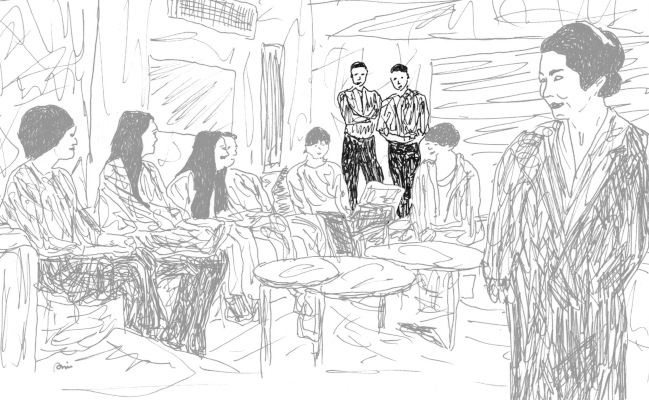 |
(Italiano) Ci sono pericoli in cui nemmeno una guardia del corpo può intervenire, spiega Heinz all'amico frustrato in salotto, mentre la zia di Takumi ispeziona l'appartamento con sguardo severo e le sue tre figlie siedono accanto timidamente. |
(Deutsch) Es gibt Gefahren, bei denen selbst ein Leibwächter nicht eingreifen darf, erklärt Heinz seinem frustrierten Freund im Wohnzimmer, während Takumis Tante mit strengem Blick die Wohnung inspiziert und ihre drei Töchter schüchtern danebensitzen. Normal Version | ||
Tag 13 1 Heinz: Was geht denn hier vor? |
Day 13 Heinz: And what's going on here? |
Jour 13 Heinz : Mais qu'est-ce qui se passe ici ? |
Giorno 13 Heinz: Ma cosa sta succedendo qui? |
Día 13 Heinz: ¿Qué está pasando aquí? |
2 Heinz: Jetzt komm mal von der Tür weg! Lass die miteinander reden! Los! |
Heinz: Now get away from the door! Let them talk to each other! Come on! |
Heinz : Maintenant, éloigne-toi de la porte. Laisse-les parler entre eux ! Allez ! |
Heinz: Ora allontanati dalla porta! Lasciali parlare tra loro! Forza! |
Heinz: ¡Ahora aléjate de la puerta! ¡Deja que hablen! ¡Vamos! |
3 Helmut: Das ist alles nicht gut, Mann! Wo ist die jetzt hingegangen? |
Helmut: All this is no good, man! Where has she gone now? |
Helmut : Tout cela n'est pas bon, mec ! Où est-elle allée maintenant ? |
Helmut: Tutto questo non va bene, amico! Dov'è andata adesso? |
Helmut: ¡Todo esto no está bien, tío! ¿A dónde ha ido ahora? |
4 Helmut: Na super! Ich ... oh, da kommen die Nichten. Ja, äh, klar, setzt euch doch! |
Helmut: Brilliant! I... oh, here come the nieces. Yes, uh, sure, have a seat! |
Helmut : Super ! Je... oh, voilà les nièces. Oui, euh, bien sûr, asseyez-vous ! |
Helmut: Geniale! Io... oh, ecco che arrivano le nipoti. Sì, ehm, certo, accomodatevi! |
Helmut: ¡Brillante! Yo... oh, aquí vienen las sobrinas. Sí, ehm, claro, ¡sentaos! |
5 Heinz: Jetzt werd ich selbst langsam nervös. |
Heinz: Now I'm starting to get nervous myself. |
Heinz : Là, je commence à être nerveux moi aussi. |
Heinz: Ora comincio a innervosirmi anch'io. |
Heinz: Ahora yo también empiezo a ponerme nervioso. |
6 Heinz: Ausgezeichnete Idee! Ich sehe, du denkst mit! Wo ist denn ...? Ah, da, die Fernbedienung. So, ein bisschen lauter noch, ja, so ist es gut. ♫ Tapp tapp, yeah yeah |
Heinz: Excellent idea! I see you're following along! Where is...? Ah, there, the remote control. Now, a little louder, yes, that's good. ♫ Tap tap, yeah yeah |
Heinz : Excellente idée ! Je vois que tu penses avec moi ! Où est donc... ? Ah, la voilà, la télécommande. Voilà, un peu plus fort, oui, c'est bien. ♫ Tap tap, yeah yeah |
Heinz: Ottima idea! Vedo che la pensi come me! Dov'è...? Ah, ecco il telecomando. Così, un po' più forte, sì, va bene. ♫ Tap tap, yeah yeah |
Heinz: ¡Excelente idea! Veo que piensas como yo. ¿Dónde está...? Ah, aquí está el mando a distancia. Así, un poco más alto, sí, está bien. ♫ Tap tap, yeah yeah |
(English) The next day, the six flatmates visit a sashimono master, where they meet their friend Tsumugi and an acquaintance who the Boys hope will give them a positive impulse. They are not disappointed. |
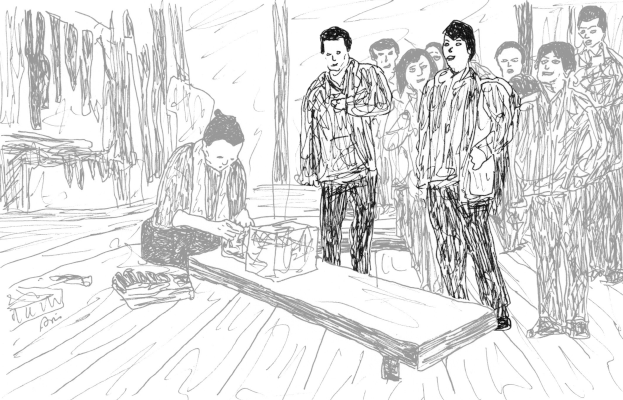 |
(Italiano) Il giorno successivo, i sei coinquilini visitano un maestro di sashimono, dove incontrano il loro amico Tsumugi e un conoscente che i Ragazzi sperano possa dare loro un impulso positivo. Non rimangono delusi. |
(Deutsch) Am nächsten Tag besuchen die sechs WG-Bewohner einen Sashimono-Meister, wo sie zum einen auf die befreundete Tsumugi treffen und zum anderen auf einen Bekannten, von dem sich die Jungs einen positiven Impuls wünschen. Sie werden nicht enttäuscht. Normal Version | ||
Tag 14 1 Helmut: Ren sagt, dass wir schon auf der richtigen Straße sind. Wir sind gleich da. |
Day 14 Helmut: Ren says we're already on the right road. We're almost there. |
Jour 14 Helmut : Ren dit que nous sommes déjà dans la bonne rue. Nous y sommes presque. |
Giorno 14 Helmut: Ren dice che siamo già sulla strada giusta. Siamo quasi arrivati. |
Día 14 Helmut: Ren dice que ya vamos en la calle correcta. Ya casi estamos. |
2 Heinz: Sieh dir Takumi doch an! Seit dem kleinen Motivationsgespräch mit seiner Tante gestern ist er völlig durch den Wind. |
Heinz: Just look at Takumi! Since the little motivational talk with his aunt yesterday, he's completely lost it. |
Heinz : Regarde donc Takumi ! Depuis la petite discussion de motivation avec sa tante hier, il est complètement à l'ouest. |
Heinz: Basta guardare Takumi! Dopo il discorsetto motivazionale di ieri con sua zia, ha perso completamente la testa. |
Heinz: ¡Basta con mirar a Takumi! Después de la charla motivacional de ayer con su tía, está totalmente despistado. |
3 Helmut: (...) Glaubst du, jetzt ist ein guter Zeitpunkt? |
Helmut: (...) Do you think now is a good moment? |
Helmut : (...) Tu penses que c'est le bon moment ? |
Helmut: (...) Pensi che sia un buon momento? |
Helmut: (...) ¿Crees que ahora es un buen momento? |
4 Helmut: Lass mich sofort los, Ausländer! Das ist Freiheitsberaubung. Nje, nje |
Helmut: Let go of me now, foreigner! That's unlawful restraint. Nyeh, nyeh |
Helmut : Lâche-moi tout de suite, étranger ! C'est de la privation de liberté. Nyeh, nyeh |
Helmut: Lasciami subito andare, straniero! Questa è privazione della libertà. Nyeh, nyeh |
Helmut: ¡Suéltame ahora mismo, extranjero! Eso es privación de libertad. Ñeh, ñeh |
5 Helmut: Nein, dass ich sentimental werde! Schnief! Ähem, also dies hier war einer meiner Prototypen, siehst du? Das Holzstück hier ... |
Helmut: No, that I get sentimental! Sob! Ahem, so this here was one of my prototypes, see? This piece of wood here... |
Helmut : Non, que je devienne sentimental ! Renifle ! Ahem, donc ceci était l'un de mes prototypes, tu vois ? Ce morceau de bois ici... |
Helmut: No, che io diventi sentimentale! Sniff! Ahem, questo era uno dei miei prototipi, vedi? Questo pezzo di legno qui... |
Helmut: ¡No, que me ponga sentimental! ¡Sniff! Ejem, así que este de aquí era uno de mis prototipos, ¿ves? Este trozo de madera aquí... |
6 Helmut: Pust, pust, reib, putz. Ich hatte die für meinen Sohn gemacht in der Hoffnung, dass er irgendwann wiederkommt. |
Helmut: Blow, blow, rub, clean. I made it for my son in the hope that he'd come back one day. |
Helmut : Souffle, souffle, frotte, nettoie. Je l'ai fait pour mon fils dans l'espoir qu'il revienne un jour. |
Helmut: Soffia, soffia, strofina, pulisci. L'ho fatto per mio figlio nella speranza che un giorno tornasse. |
Helmut: Sopla, sopla, frota, limpia. Lo hice para mi hijo con la esperanza de que algún día volviera. |
(English) Heinz spends the evening with Tsumugi and doesn't come home until the next day. He makes up to Helmut, who has arranged this trip for him, with an exquisite sweet and wonders about the blinking plastic heart on the living room wall. |
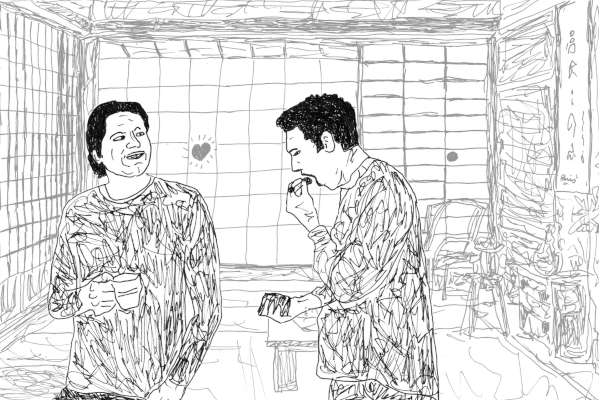 |
(Italiano) Heinz trascorre la serata con Tsumugi e torna a casa solo il giorno dopo. Per ricambiare Helmut, che gli ha procurato questa gita, gli regala un dolce squisito e si stupisce del cuore di plastica lampeggiante sulla parete del soggiorno.
|
(Deutsch) Heinz verbringt den Abend mit Tsumugi und kommt erst am nächsten Tag nach Hause. Er revanchiert sich bei Helmut, der ihm diesen Ausflug beschert hat, mit einer exquisiten Süßigkeit und wundert sich über das blinkende Plastikherz an der Wohnzimmerwand. Normal Version | ||
Tag 15 1 Helmut: Ding dong. Dingdongdingdong! Ja ja, ich komm ja schon! Wo ist denn Ren bloß? Egal. |
Day 15 Helmut: Ding dong. Dingdongdingdong! Yes, yes, I'm coming! Where on earth is Ren? Never mind. |
Jour 15 Helmut : Ding dong. Dingdongdingdong ! Oui, oui, j'arrive ! Mais où diable est Ren ? Peu importe. |
Giorno 15 Helmut: Ding dong. Dingdongdingdong! Sì, sì, sto arrivando! Dove diavolo è Ren? Non importa. |
Día 15 Helmut: ¡Ding dong. Dingdongdingdong! ¡Sí, sí, ya voy! ¿Dónde demonios está Ren? No importa. |
2 Heinz: Schläft? Es ist elf Uhr durch. Willst du auch Kaffee? |
Heinz: Sleeping? It's past eleven o'clock. You want some coffee too? |
Heinz : Dort ? Il est onze heures passé. Tu veux aussi du café ? |
Heinz: Dorme? Sono passate le undici. Vuoi anche tu del caffè? |
Heinz: ¿Durmiendo? Son más de las once. ¿Quieres café también? |
3 Heinz: Hör auf damit! Du weiß nicht, wovon du sprichst. |
Heinz: Stop it! You don't know what you're talking about. |
Heinz : Arrête ça! Tu ne sais pas de quoi tu parles. |
Heinz: Smettila! Non sai di cosa stai parlando. |
Heinz: ¡Basta ya! No sabes de lo que estás hablando. |
4 Helmut: Na klar, na klar, warum nicht, meine Rede! Willkommen im Club der blinkenden Herzen, Mann! Komm mal hier rüber, siehst du das? |
Helmut: Of course, of course, why not, that's what I'm saying! Welcome to the blinking hearts club, man! Come over here, you see that? |
Helmut : Bien sûr, bien sûr, pourquoi pas, c'est ce que je dis ! Bienvenue au club des curs clignotants, mec ! Viens par ici, tu vois ça ? |
Helmut: Certo, certo, perché no, è quello che dico io! Benvenuto nel club dei cuori lampeggianti, amico! Vieni qui, lo vedi? |
Helmut: Claro, claro, ¿por qué no? ¡Eso es lo que digo! ¡Bienvenido al club de corazones parpadeantes, tío! Ven aquí, ¿ves eso? |
5 Heinz: Ich hätte doch dableiben sollen! Aber du hast mich ja genötigt, Tsumugi nach Hause zu bringen. |
Heinz: I should have stayed, after all! But you forced me to take Tsumugi home. |
Heinz : J'aurais dû rester ! Mais tu m'as forcé à ramener Tsumugi à la maison. |
Heinz: Sarei dovuto rimanere! Ma mi hai costretto a riportare Tsumugi a casa. |
Heinz: ¡Debería haberme quedado! Pero me obligaste a llevarme a Tsumugi a casa. |
6 Heinz: Esothetik? |
Heinz: Esothetics? |
Heinz : Esothétique ? |
Heinz: Esotismo? |
Heinz: ¿Esotética? |
7 Helmut: Da geht's dir besser als mir. Mir wird gerade furchtbar schlecht von dem ganzen türkischen Honig. |
Helmut: Then you're better off than I am. All that Turkish honey is making me dreadfully sick at the moment. |
Helmut : Alors tu es mieux loti que moi. Tout ce miel turc me rend terriblement malade en ce moment. |
Helmut: Allora stai meglio di me. Tutto quel miele turco mi fa terribilmente male. |
Helmut: Entonces estás mejor que yo. Toda esa miel turca me está poniendo terriblemente enfermo en este momento. |
(English) Several threads come together on this eventful day in Frankfurt. And tubes. After two phone calls and an extraordinary aid measure, Fanni and Fiona find themselves in a completely new situation, something they first have to digest. |
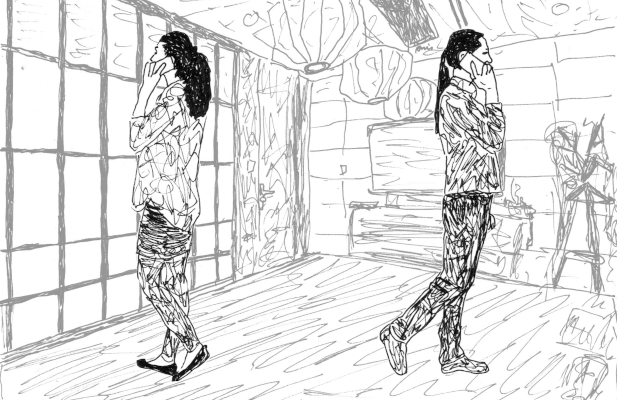 |
(Italiano) Alcuni fili si uniscono in questa giornata ricca di eventi a Francoforte. E tubi. Dopo due telefonate e una straordinaria misura di aiuto, Fanni e Fiona si ritrovano in una situazione completamente nuova, cosa che devono prima digerire. |
(Deutsch) Einige Fäden führen an diesem ereignisreichen Tag in Frankfurt zusammen. Und Schläuche. Nach zwei Telefonaten und einer außerordentlichen Hilfsmaßnahme finden sich Fanni und Fiona in einer völlig neuen Situation wieder, was sie erst einmal verdauen müssen. Normal Version | ||
Tag 15 1 Fanni: Wen suchen Sie? Die Podiumsdiskussion? Ach so, Sie sind Herr Dr. Schneidewohl, der Chirurg. Ja, da vorne rechts, sehen Sie? Die warten schon auf Sie. Nichts zu danken. |
Day 15 Fanni: Who are you looking for? The panel discussion? Oh, I see, you're Dr. Cutwel, the surgeon. Yes, over there on the right, you see it? They're already waiting for you. You're welcome. |
Jour 15 Fanni : Qui cherchez-vous ? La table ronde ? Ah, je vois, vous êtes le docteur Biencouper, le chirurgien. Oui, là-bas à droite, vous voyez ? Ils vous attendent déjà. De rien. |
Giorno 15 Fanni: Chi sta cercando? La tavola rotonda? Ah, lei è il dottor Bentagliato, il chirurgo. Sì, laggiù in fondo a destra, vede? La stanno già aspettando. Non c'è di che. |
Día 15 Fanni: ¿Quién está buscando? ¿La mesa redonda? Ah, usted es el Dr. Buencorte, el cirujano. Sí, ahí al fondo a la derecha, ¿lo ve? Ya lo están esperando. De nada. |
2 Fiona: Tuut tuut. Ja hallo, ich bin's. Sag mal, hast du vielleicht was mit dieser offiziellen und anwaltlich geprüften Verzichtserklärung zu tun, die ich vor ein paar Minuten von Wolfgang gekriegt hab? |
Fiona: Toot toot. Yeah, hi, it's me. Tell me, do you have anything to do with this official and lawyer-approved waiver that I got from Wolfgang a couple of minutes ago? |
Fiona : Tuut tuut. Oui, salut, c'est moi. Dis-moi, tu as peut-être quelque chose à voir avec cette déclaration de renonciation officielle, validée par un avocat que j'ai reçue de Wolfgang il y a quelques minutes ? |
Fiona: Tuut tuut. Sì, ciao, sono io. Dimmi, hai qualcosa a che fare con questa rinuncia ufficiale e approvata dall'avvocato che ho ricevuto da Wolfgang qualche minuto fa? |
Fiona: Tuut tuut. Sí, hola, soy yo. Dime, ¿tienes algo que ver con esta renuncia oficial y aprobada por un abogado que me dio Wolfgang hace un par de minutos? |
3 Fiona: Doch, natürlich ist es wichtig für mich, die Hintergründe zu kennen. Ehrlich gesagt bestehe ich sogar darauf, wenn ... Wer ist Vito? |
Fiona: Yes, of course it's important for me to know the background. To be honest, I even insist on it if... Who is Vito? |
Fiona : Si, bien sûr que c'est important pour moi de connaître le contexte. Honnêtement, j'insiste même si... Qui est Vito ? |
Fiona: Sì, ovviamente è importante per me conoscere il contesto. A dire il vero, insisto anche su questo se... Chi è Vito? |
Fiona: Sí, por supuesto que es importante para mí conocer los antecedentes. Para ser sincera, incluso insisto en ello si... ¿Quién es Vito? |
4 Fanni: Du wirst es nicht glauben, das war meine alte Freundin Nicoleta. Sie will uns bei einem Getränk von ihrem Spukschloss in Rumänien erzählen. Hast du Lust? |
Fanni: You won't believe it, that was my old friend Nicoleta. She wants to tell us about her haunted castle in Romania over a drink. Are you up for it? |
Fanni : Tu ne vas pas le croire, c'était ma vieille amie Nicoleta. Elle veut nous parler de son château hanté en Roumanie autour d'un verre. Tu es partante ? |
Fanni: Non ci crederai, era la mia vecchia amica Nicoleta. Vuole raccontarci del suo castello stregato in Romania davanti a un drink. Ti va di farlo? |
Fanni: No te lo vas a creer, era mi vieja amiga Nicoleta. Quiere contarnos sobre su castillo encantado en Rumanía delante de una copa. ¿Te apetece? |
5 Fanni: Waaaaaass??!! Aber das ist ... das ist fantastisch! YEEAH! |
Fanni: Whaaaaaatt??!! But that's... that's fantastic! YEEAH! |
Fanni : Quooooooii ??!! Mais c'est... c'est fantastique ! YEEAH ! |
Fanni: Cosaaaaaaa??!! Ma è... è fantastico! YEEAH! |
Fanni: ¡¡¿¿Quéééééééé??!! ¡Pero eso es... es fantástico! ¡YEEAH! |
6 Fanni: Naja, in Wirklichkeit ... Hey, was waren das für Schreie? |
Fanni: Well, in reality... Hey, what were those screams? |
Fanni : Eh bien, en réalité... Hé, c'était quoi ces cris ? |
Fanni: Beh, in realtà... Ehi, cos'erano quelle urla? |
Fanni: Bueno, en realidad... Oye, ¿qué eran esos gritos? |
(English) The deadline for Takumi's research paper is approaching and Helmut has no objection to quitting his job as a bodyguard. While Heinz tries to explain to him that the deadline won't solve all the problems, the two get surprised by the latest developments in Takumi's family. |
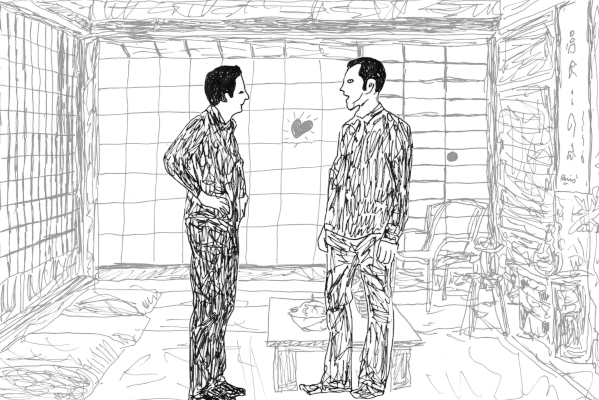 |
(Italiano) La scadenza per l'articolo di ricerca di Takumi si avvicina e Helmut non ha nulla in contrario a lasciare il suo lavoro di guardia del corpo. Mentre Heinz cerca di fargli capire che la scadenza non risolve tutti i problemi, i due vengono sorpresi dagli ultimi sviluppi nella famiglia di Takumi. |
(Deutsch) Der Abgabetermin für Takumis Forschungspapier rückt näher und Helmut hat nichts dagegen, seinen Leibwächterjob zu beenden. Während Heinz ihm zu vermitteln versucht, dass der Termin nicht alle Probleme löst, werden die beiden von den neusten Entwicklungen in Takumis Familie überrascht. Normal Version | ||
Tag 16 1 Heinz: Und? |
Day 16 Heinz: And? |
Jour 16 Heinz : Et ? |
Giorno 16 Heinz: E? |
Día 16 Heinz: ¿Y? |
2 Helmut: Ren hat ihr gestern erzählt, dass er uns aus Deutschland abgeholt hat. |
Helmut: Ren told her yesterday that he picked us up from Germany. |
Helmut : Ren lui a dit hier qu'il était venu nous chercher en Allemagne. |
Helmut: Ieri Ren le ha detto che è venuto a prenderci in Germania. |
Helmut: Ayer Ren le dijo que venía a recogernos a Alemania. |
3 Heinz: Nee, Mann, wir müssen schon geordnete Verhältnisse hinterlassen. Das wäre sonst unjapanisch. |
Heinz: Nah, man, we have to ensure that we leave things in order. Everything else would be un-Japanese. |
Heinz : Non, mec, on doit s'assurer de laisser les choses en ordre. Sinon, ce ne serait pas japonais. |
Heinz: No, amico, dobbiamo assicurarci di lasciare le cose in ordine. Altrimenti non sarebbe giapponese. |
Heinz: No, tío, tenemos que asegurarnos de dejar las cosas en orden. Si no, no sería japonés. |
4 Heinz: Rumpelstilzchen. Sag mal, hast du inzwischen eigentlich Madame Laila wegen dem Ring gefragt? |
Heinz: Rumpelstiltskin. Tell me, have you actually asked Madame Laila about the ring? |
Heinz : Rumpelstiltskin. Dis-moi, entre-temps, as-tu demandé Madame Laila au sujet de la bague ? |
Heinz: Tremotino. Dimmi, nel frattempo, hai chiesto a Madame Laila per l'anello? |
Heinz: Rumpelstiltskin. Dime, ¿le has preguntado ya a Madame Laila sobre el anillo? |
5 Helmut: Korrekte Berechnung. Was wollte eigentlich Fiona gerade am Telefon? |
Helmut: Correct calculation. By the way, what did Fiona want on the phone just now? |
Helmut : Calcul correct. Au fait, que voulait Fiona au téléphone tout à l'heure ? |
Helmut: Calcolo corretto. A proposito, cosa voleva Fiona al telefono poco fa? |
Helmut: Cálculo correcto. Por cierto, ¿qué quería Fiona por teléfono hace un momento? |
(English) In all the excitement, Helmut has forgotten that Takumi has repeatedly told him about one of the regular Lodge meetings taking place the following day. They expect to be safe in this remote location, but this safety is deceptive. |
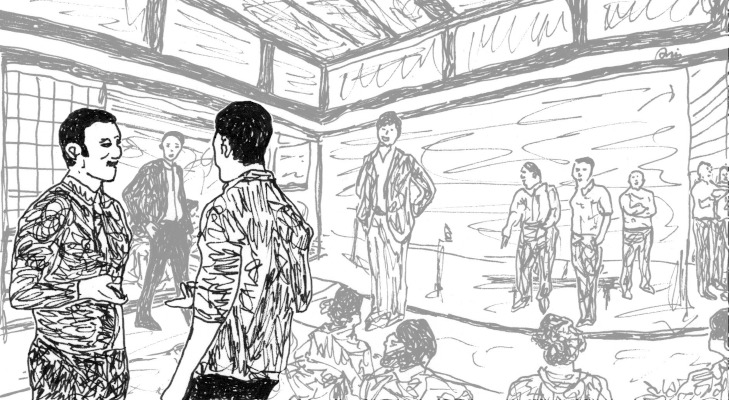 |
(Italiano) Con tutto il trambusto, Helmut si è dimenticato che Takumi gli aveva fatto notare più volte che il giorno dopo si sarebbe tenuto uno dei regolari incontri della Loggia. Credono di essere al sicuro in questo luogo remoto, ma la sicurezza è ingannevole. |
(Deutsch) Bei all der Aufregung ist Helmut entfallen, dass Takumi ihn mehrfach auf eines der regelmäßigen Logentreffen hingewiesen hat, das am Folgetag stattfindet. Sie wähnen sich an diesem entfernten Ort in Sicherheit, doch diese Sicherheit ist trügerisch. Normal Version | ||
Die Intervention Tag 17 1 Heinz: Plopp. Pause! |
The Intervention Day 17 Heinz: Plop. Pause! |
L'intervention Jour 17 Heinz : Plop. Pause ! |
L'intervento Giorno 17 Heinz: Plop. Pausa! |
La Intervención Día 17 Heinz: Plop. ¡Pausa! |
2 Helmut: Wenn es nicht so schlimm wäre, würden sie nicht sofort anreisen. Sie würden erst mal telefonieren. |
Helmut: If it weren't that bad, they wouldn't come here straight away. They'd make a phone call first. |
Helmut : Si ce n'était pas si grave, ils n'arriveraient pas tout de suite. Ils passeraient d'abord un coup de fil. |
Helmut: Se non fosse così grave, non arriverebbero subito. Prima farebbero una telefonata. |
Helmut: Si no fuera tan malo, no llegarían enseguida. Primero habrían llamado por teléfono. |
3 Heinz: Die Loge lässt den Leuten Raum zur Entfaltung. Das war ja auch das Thema des Vortrags gerade. |
Heinz: The Lodge leaves room for people to unfold. After all, that was the topic of the lecture just now. |
Heinz : La Loge laisse de la place aux gens pour s'épanouir. Après tout, c'était le sujet de la conférence tout à l'heure. |
Heinz: La Loggia lascia spazio alle persone per realizzarsi. Dopotutto, questo era l'argomento della conferenza di poco fa. |
Heinz: La Logia deja espacio para que la gente se desarrolle. Al fin y al cabo, ese era el tema de la conferencia de hace un momento. |
4 Helmut: Können wir nicht irgendwas tun? Da! Der Samuraijunge nähert sich den aufgebrachten Eltern und wird von der Domina im Minirock zurückgehalten! |
Helmut: Isn't there anything we can do? There! The samurai boy approaches the angry parents and is held back by the dominatrix in the miniskirt! |
Helmut : On ne peut rien faire ? Là ! Le garçon samouraï s'approche des parents furieux et est retenu par la dominatrice en minijupe ! |
Helmut: Non possiamo fare niente? Ecco! Il ragazzo samurai si avvicina ai genitori arrabbiati e viene trattenuto dalla dominatrice in minigonna! |
Helmut: ¿No hay nada que podamos hacer? ¡Ahí! ¡El chico samurái se acerca a los padres enfadados y la dominatrix en minifalda lo detiene! |
5 Heinz: Nein, Mann, das ist, was ich ausgehandelt habe. Mit Hilfe von Ren und diesem ausgezeichneten Universalübersetzer. |
Heinz: No, man, that's what I negotiated. With the help of Ren and this excellent universal translator. |
Heinz : Non, mec, c'est ce que j'ai négocié. Avec l'aide de Ren et de cet excellent traducteur universel. |
Heinz: No, amico, è quello che ho negoziato. Con l'aiuto di Ren e di questo eccellente traduttore universale. |
Heinz: No, tío, eso es lo que negocié. Con la ayuda de Ren y este excelente traductor universal. |
6 Helmut: Ach nö, Heinz! Wieso das denn jetzt? |
Helmut: Oh no, Heinz! Why are you doing this now? |
Helmut : Oh non, Heinz ! Pourquoi fais-tu ça maintenant ? |
Helmut: Oh no, Heinz! Perché lo stai facendo adesso? |
Helmut: ¡Oh, no, Heinz! ¿Por qué haces esto ahora? |
(English) They leave the Lodge meeting as a trio, because Heinz wants to consult with the spirit of old Takumi again in an undisturbed place. Helmut, who has had bad experiences with the spirit, comes up with a few tricks to stall the meeting. |
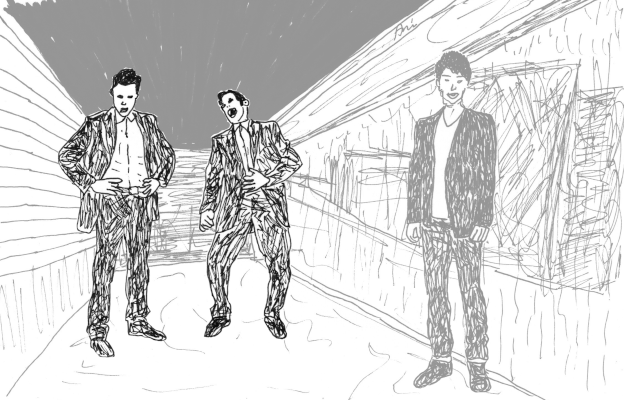 |
(Italiano) Escono dalla riunione della Loggia in tre, perché Heinz vuole consultare di nuovo lo spirito del vecchio Takumi in un luogo appartato. Helmut, che ha avuto brutte esperienze con lo spirito, escogita alcuni trucchi per ritardare l'incontro. |
(Deutsch) Zu dritt verlassen sie das Treffen der Loge, denn Heinz will sich an einem ungestörten Ort erneut mit dem Geist des alten Takumi beraten. Helmut, der schlechte Erfahrungen mit dem Geist gemacht hat, fallen einige Tricks ein, um die Begegnung hinauszuzögern. Normal Version | ||
Der Doppeltock Tag 17 1 Heinz: Warte, lasst mich erst nachkucken! OK, die Luft ist rein. |
The Double Tock Day 17 Heinz: Wait, let me check first! OK, the coast is clear. |
Le Double toc Jour 17 Heinz : Attendez, laisse-moi d'abord vérifier ! OK, la voie est libre. |
Il Doppio toc Giorno 17 Heinz: Aspetta, fatemi controllare prima! OK, via libera. |
El Doble toc Día 17 Heinz: ¡Espera, déjadme mirar primero! Vale, el camino está libre. |
2 Heinz: Ich schalte schon mal den Übersetzer ein. Takumi, bist du bereit, dem Geist deines Urahns wiederzubegegnen? Gut. Was? Was für eine Begründung? |
Heinz: I'll switch on the translator. Takumi, are you ready to meet the spirit of your great-grandfather again? Good. What? What good reason? |
Heinz : Je vais allumer le traducteur. Takumi, es-tu prêt à rencontrer à nouveau l'esprit de ton ancêtre ? Bien. Quoi ? Quelle bonne raison ? |
Heinz: Accendo il traduttore. Takumi, sei pronto a incontrare di nuovo lo spirito del tuo antenato? Bene. Cosa? Quale buona ragione? |
Heinz: Voy a encender el traductor. Takumi, ¿estás listo para reencontrarte con el espíritu de tu antepasado? Bien. ¿Qué? ¿Qué buen motivo? |
3 Helmut: Zum Beispiel dachten wir zuerst, dass das Zeichen so geht: ♪ Dam-daddel-daa-dam h tock-tock! Aber dann haben wir die Kurzfassung gefunden, das schlichte und schnörkellose Tocktocktock. |
Helmut: For example, at first we thought that the sign would go like this: ♪ Dum-duddle-daa-dum h tock-tock! But then we found the short version, the simple and straightforward tocktocktock. |
Helmut : Par exemple, nous avons d'abord pensé que le signe se ferait comme ça : ♪ Dam-dad-l-daa-dam h toc-toc ! Mais ensuite, nous avons trouvé la version courte, le toc-toc-toc simple et sans fioritures. |
Helmut: Per esempio, all'inizio pensavamo che il segno sarebbe stato così: ♪ Dam-dadl-daa-dam h toc-toc! Ma poi abbiamo trovato la versione breve, il toc-toc-toc semplice e senza fronzoli. |
Helmut: Por ejemplo, al principio pensamos que el signo sería así: ♪ ¡Dam-dadl-daa-dam h toc-toc! Pero luego encontramos la versión corta, el toc-toc-toc simple y sin florituras. |
4 Helmut: Lass mal meinen Nachfahren näher an der Wand stehen! Der wird ja ganz nass! |
Helmut: Now let my descendant stand closer to the wall! He's getting all wet! |
Helmut : Mais laisse mon descendant se rapprocher du mur ! Il est en train de se mouiller ! |
Helmut: Ora fai stare il mio discendente più vicino al muro! Si sta bagnando tutto! |
Helmut: ¡Ahora deja que mi descendiente se acerque más a la pared! ¡Se está mojando todo! |
5 Helmut: Ha ha haaaaa! Dein Gesicht! Du hast mir das echt abgenommen. Ich hab dich voll verarscht! Ha ha ha! |
Helmut: Ha ha haaaaa! Your face! You really bought it. I totally took the piss out of you! Ha ha ha! |
Helmut : Ha ha haaaaa ! Ton visage ! Tu l'as vraiment gobée. Je t'ai bien eu ! Ha ha ha ! |
Helmut: Ah ah aaaaah! La tua faccia! Ti sei proprio bevuto il mio scherzo. Mi hai davvero creduto. Ti ho fregato alla grande! Ah ah ah! |
Helmut: ¡Ja, ja, jaaaaa! ¡Tu cara! Te lo has tragado. ¡Te he tomado el pelo a lo grande! ¡Ja, ja, ja! |
(English) Protected from the rain under a roof, Heinz talks to the ghost, for whom the unconscious Helmut serves as a host body. But Heinz also wants to consult with Helmut. It turns out that this problem can be solved quite easily. Inspired by the rain, Heinz then comes up with an adventurous idea. |
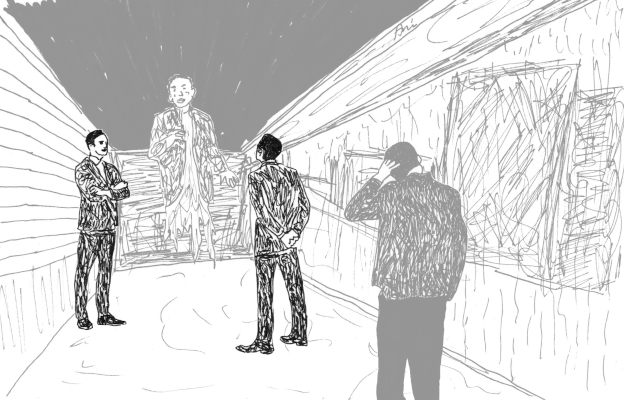 |
(Italiano) Sotto un tetto al riparo dalla pioggia, Heinz parla con lo spirito, per il quale Helmut, privo di sensi, funge da corpo ospite. Ma Heinz vuole anche consultarsi con Helmut. Si scopre che questo problema è facilmente risolvibile. Ispirato dalla pioggia, Heinz ha quindi un'idea avventurosa. |
(Deutsch) Unter einem Dach vor dem Regen geschützt spricht Heinz mit dem Geist, dem der bewusstlose Helmut als Wirtskörper dient. Aber Heinz will sich auch mit Helmut beraten. Es stellt sich heraus, dass dieses Problem ganz einfach lösbar ist. Vom Regen inspiriert kommt Heinz daraufhin auf eine abenteuerliche Idee. Normal Version | ||
Tag 17 1 Heinz: Bist du wirklich Takumi? |
Day 17 Heinz: Are you really Takumi? |
Jour 17 Heinz : Es-tu vraiment Takumi ? |
Giorno 17 Heinz: Sei davvero Takumi? |
Día 17 Heinz: ¿De verdad eres Takumi? |
2 Helmut: Und? |
Helmut: And? |
Helmut : Et ? |
Helmut: E? |
Helmut: ¿Y? |
3 Helmut: (Kuck mal, wie sein Hemd unter der Gürtellinie flattert! Kein Wunder, dass er sich so selten sehen lässt! Hi hi) |
Helmut: (Look how his shirt is flapping below the belt! No wonder he rarely shows himself! Hee hee) |
Helmut : (Regarde comme sa chemise flotte sous la ceinture ! Pas étonnant qu'il se montre si rarement ! Hi hi) |
Helmut: (Guarda come gli sventola la camicia sotto la cintura! Non c'è da stupirsi che si faccia vedere così raramente! Hi hi) |
Helmut: (¡Mira cómo le ondea la camisa por debajo del cinturón! ¡No es de extrañar que se deje ver tan poco! Je, je) |
4 Heinz: Es tropft ... und tropft ... und ... Können wir nicht zusammen nach Edo reisen? |
Heinz: It's dripping... and dripping... and... Can't we travel to Edo together? |
Heinz : Ça dégouline... et ça dégouline... et... On ne pourrait pas voyager ensemble à Edo ? |
Heinz: Sta gocciolando... e gocciolando... e... Non possiamo viaggiare insieme a Edo? |
Heinz: Gotea... y gotea... y... ¿No podríamos viajar juntos a Edo? |
5 Helmut: Also Wasser gibt's hier genug. |
Helmut: Well, there is plenty of water here. |
Helmut : Eh bien, il y a beaucoup d'eau ici. |
Helmut: Beh, c'è molta acqua qui. |
Helmut: Bueno, aquí hay mucha agua. |
(English) Heinz and Helmut manage to get to Edo together with the two Takumis. Disembodied. Communication with the locals largely breaks down, but the four of them witness a scene that happened long ago. |
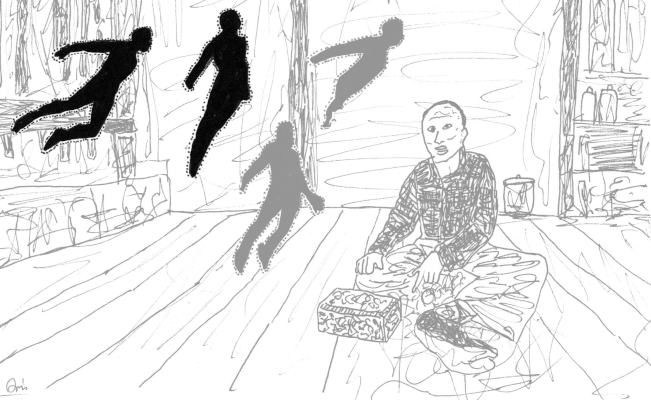 |
(Italiano) Heinz e Helmut riescono a raggiungere Edo insieme ai due Takumi. Disincarnati. La comunicazione con i giapponesi se corta casi por completo, ma i quattro vengono testimoni di una scena che si è svolta molto tempo fa. |
(Deutsch) Es gelingt Heinz und Helmut, zusammen mit den beiden Takumis nach Edo zu gelangen. Körperlos. Die Kommunikation mit den Japanern bricht zwar weitgehend ab, doch werden die vier Zeugen einer Szene, die sich vor langer Zeit abgespielt hat. Normal Version | ||
Tag 17 1 Helmut: Heinz? |
Day 17 Helmut: Heinz? |
Jour 17 Helmut : Heinz ? |
Giorno 17 Helmut: Heinz? |
Día 17 Helmut: ¿Heinz? |
2 Helmut: Nein, jemand hat meinen Namen gerufen. |
Helmut: No, someone called my name. |
Helmut : Non, quelqu'un a appelé mon nom. |
Helmut: No, qualcuno ha chiamato il mio nome. |
Helmut: No, alguien ha llamado mi nombre. |
3 Helmut: Mir kommt das irgendwie bekannt vor. Ist das nicht die Sushi-Werkstatt? Sashi? Mono? Hm, aber die Tür ist anders. |
Helmut: It looks familiar somehow. Isn't that the sushi shop? Sashi? Mono? Hm, but the door is different. |
Helmut : Ça me dit quelque chose. Ce n'est pas l'atelier de sushi ? Sashi ? Mono ? Hum, mais la porte est différente. |
Helmut: Mi sembra familiare. Non è il laboratorio di sushi? Sashi? Mono? Hm, ma la porta è diversa. |
Helmut: Me suena familiar. ¿No es el taller de sushi? ¿Sashi? ¿Mono? Hum, pero la puerta es diferente. |
4 Helmut: Wir fliegen einfach durch die Wand hier, das haben wir früher schon gemacht, das ist kein Problem. |
Helmut: We just fly through the wall here, we've done that before, it's no problem. |
Helmut : Nous allons simplement traverser le mur, nous l'avons déjà fait auparavant, ce n'est pas un problème. |
Helmut: Voleremo semplicemente attraverso il muro qui, l'abbiamo già fatto prima, non è un problema. |
Helmut: Simplemente atravesaremos la pared, ya lo hemos hecho antes, no hay problema. |
5 Heinz: Zum Beispiel! Der Geist hat nichts über sie gesagt. |
Heinz: For example! The ghost didn't say anything about her. |
Heinz : Par exemple ! Le fantôme n'a rien dit à son sujet. |
Heinz: Per esempio! Il fantasma non ha detto niente di lei. |
Heinz: ¡Por ejemplo! El fantasma no dijo nada sobre ella. |
(English) Heinz wants to move on to find the man with one hand, but he encounters some resistance. When he and the others finally manage to locate Takumi's son, they are amazed, and for several reasons. |
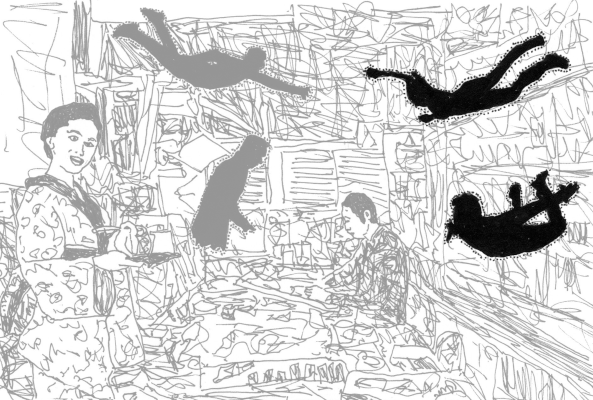 |
(Italiano) Heinz vuole andare avanti per trovare l'uomo con una mano sola, ma incontra qualche resistenza. Quando lui e gli altri finalmente riescono a trovare il figlio di Takumi, lo stupore è grande, e per diversi motivi. |
(Deutsch) Heinz will weiterziehen, um den Mann mit der einen Hand zu finden, doch stößt er auf einen Widerstand. Als es ihm und den anderen schließlich gelingt, Takumis Sohn ausfindig zu machen, ist das Erstaunen groß, und das aus gleich mehreren Gründen. Normal Version | ||
Tag 18 1 Helmut: Es ruckelt ein bisschen, aber sonst passiert nichts. |
Day 18 Helmut: It's shaking a little, but otherwise nothing's happening. |
Jour 18 Helmut : Ça secoue un peu, mais sinon, il ne se passe rien. |
Giorno 18 Helmut: Scuote un po', ma per il resto non succede niente. |
Día 18 Helmut: Está temblando un poquito, pero por lo demás no pasa nada. |
2 Heinz: Komm, hilf mir mal! Wir müssen durchs Dach und die beiden in Schlepptau nehmen. Konzentrier dich! |
Heinz: Come on, work with me! We have to get through the roof and take the two of them in tow. Focus! |
Heinz : Allez, aide-moi ! Il faut qu'on passe par le toit et qu'on emmène les deux en remorque. Concentre-toi ! |
Heinz: Dai, aiutami! Dobbiamo passare dal tetto e tirarli con noi. Concentrati! |
Heinz: ¡Venga, ayúdame! Tenemos que pasar por el tejado y llevarlos a rastras. ¡Concéntrate! |
3 Helmut: Wir sind nur vier Häuserblocks entfernt. Die Reise geht bestimmt gleich weiter. |
Helmut: We're only four blocks away. The journey will certainly continue soon. |
Helmut : Nous ne sommes qu'à quatre pâtés de maisons. Le voyage va certainement se poursuivre bientôt. |
Helmut: Siamo solo a quattro isolati di distanza. Il viaggio continuerà sicuramente presto. |
Helmut: Estamos a solo cuatro manzanas. El viaje sin duda continuará pronto. |
4 Helmut: Wo ist der Junge? Ah, da. Er schreibt irgendwas. Hey, vielleicht ist das ein Aufsatz über Algen! |
Helmut: Where is the boy? Ah, there he is. He's writing something. Hey, maybe it's an essay about algae! |
Helmut : Où est le garçon ? Ah, le voilà. Il écrit quelque chose. Hé, c'est peut-être un essai sur les algues ! |
Helmut: Dov'è il ragazzo? Ah, eccolo lì. Sta scrivendo qualcosa. Ehi, forse è un saggio sulle alghe! |
Helmut: ¿Dónde está el chico? Ah, ahí. Está escribiendo algo. ¡Oye, a lo mejor es un ensayo sobre algas! |
5 Heinz: Der junge Mann hat schnell gelernt. Wahrscheinlich hat er vorher mit derselben Energie Holz bearbeitet, wie er jetzt malt. Er sucht seinen Stil und probiert verschiedene Techniken aus. |
Heinz: The young man has learned quickly. He probably used to work with wood with the same energy that he now puts into painting. He is searching for his style and trying out different techniques. |
Heinz : Le jeune homme a appris vite. Il devait travailler le bois avec la même énergie que celle qu'il met maintenant dans la peinture. Il cherche son style et essaie différentes techniques. |
Heinz: Il giovane ha imparato in fretta. Probabilmente lavorava il legno con la stessa energia che ora mette nella pittura. Sta cercando il suo stile e sperimentando diverse tecniche. |
Heinz: El joven ha aprendido rápido. Probablemente solía trabajar la madera con la misma energía que ahora pone en la pintura. Está buscando su estilo y probando diferentes técnicas. |
(English) Heinz takes advantage of Takumi's momentary confusion to ask him about the background to what the group saw in Edo. When Heinz knows what he needs to know, he gives the ghost some points to consider, and a constructive argument ensues. |
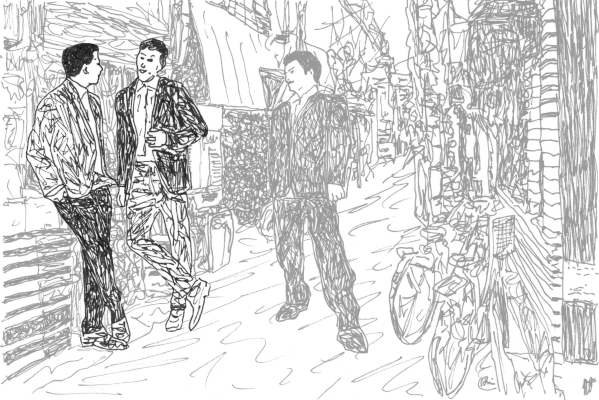 |
(Italiano) Heinz approfitta dell'attuale confusione di Takumi per chiedergli il retroscena di ciò che il gruppo ha visto a Edo. Quando Heinz sa ciò che deve sapere, dà allo spirito qualcosa su cui riflettere e ne nasce una discussione costruttiva. |
(Deutsch) Heinz nutzt Takumis momentane Verwirrung, um ihn nach den Hintergründen dessen zu fragen, was die Gruppe in Edo gesehen hat. Als Heinz weiß, was er wissen muss, gibt er dem Geist einiges zu bedenken und es kommt zu einem konstruktiven Streit. Normal Version | ||
schmieden Tag 18 1 Heinz: Dann waren wir ungefähr zehn Stunden unterwegs in Edo. Wir sollten uns so was merken. |
the Iron Day 18 Heinz: So we were traveling in Edo for about ten hours. We should remember things like that. |
le fer Jour 18 Heinz : On a donc voyagé à Edo pendant environ dix heures. On devrait se souvenir de ce genre de choses. |
il ferro Giorno 18 Heinz: Quindi abbiamo viaggiato a Edo per circa dieci ore. Dovremmo ricordarci cose del genere. |
el hierro Día 18 Heinz: Así que estuvimos viajando en Edo durante unas diez horas. Deberíamos recordar este tipo de cosas. |
2 Heinz: Du kennst doch das Sprichwort: Man soll das Eisen schmieden, solange es heiß ist. |
Heinz: You know the saying: forge the iron while it's hot. |
Heinz : Tu connais le proverbe : il faut battre le fer tant qu'il est chaud. |
Heinz: Conosci il proverbio: Forgia il ferro finché è caldo. |
Heinz: Ya sabes el dicho: forja el hierro mientras está caliente. |
3 Heinz: Ja, ein paar Häuserblocks entfernt. Warum hat er dich nie besucht? |
Heinz: Yes, a few blocks away. Why did he never visit you? |
Heinz : Oui, à quelques pâtés de maisons. Pourquoi n'est-il jamais venu te voir ? |
Heinz: Sì, a pochi isolati di distanza. Perché non è mai venuto a trovarti? |
Heinz: Sí, a unas pocas manzanas de distancia. ¿Por qué nunca vino a verte? |
4 Heinz: Hatte er denn Grund für Zorn? Warum hat er dich nicht besucht? |
Heinz: Did he have reason to be angry? Why didn't he visit you? |
Heinz : Avait-il des raisons d'être en colère ? Pourquoi ne t'a-t-il pas rendu visite ? |
Heinz: Aveva motivo di essere arrabbiato? Perché non è venuto a trovarti? |
Heinz: ¿Tenía motivos para estar enfadado? ¿Por qué no te visitó? |
5 Helmut: Es spielt keine Rolle mehr. Ich hätte einer Heirat nicht im Weg gestanden, das wusste Asuka. Auch wenn seine Frau aus einer zweifelhaften Familie kam. |
Helmut: It doesn't matter anymore. I wouldn't have stood in the way of a marriage, Asuka knew that. Even if his wife came from a dubious family. |
Helmut : Ça n'a plus d'importance. Je n'aurais pas fait obstacle à un mariage, Asuka le savait. Même si sa femme venait d'une famille douteuse. |
Helmut: Non ha più importanza. Non mi sarei opposto a un matrimonio, Asuka lo sapeva. Anche se sua moglie proveniva da una famiglia discutibile. |
Helmut: Ya no importa. Yo no me habría interpuesto en un matrimonio, Asuka lo sabía. Incluso si su esposa procedía de una familia dudosa. |
6 Heinz: Nein, er hätte dich trotzdem besucht. Es muss doch einen plausiblen Grund geben! |
Heinz: No, he would have visited you anyway. There must be a plausible reason! |
Heinz : Non, il serait quand même venu te voir. Il doit bien y avoir une raison plausible ! |
Heinz: No, ti avrebbe comunque fatto visita. Deve esserci una ragione plausibile! |
Heinz: No, de todos modos habría venido a verte. ¡Tiene que haber una razón plausible! |
(English) After they have dropped Takumi off at his family's on time, Heinz tells his friend about what he discussed with the ghost the day before. Helmut is not pleased with what he hears, but Heinz knows what he is doing and is pleased with the little piece of home he unexpectedly finds. |
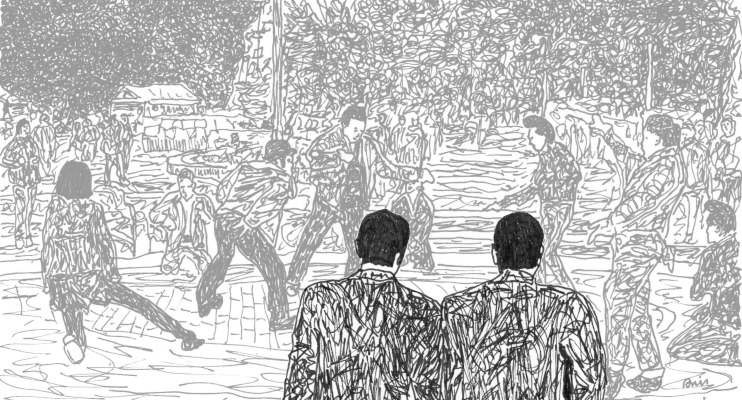 |
(Italiano) Dopo aver lasciato puntualmente Takumi dalla sua famiglia, Heinz racconta al suo amico quello che ha discusso con il fantasma il giorno prima. Helmut non è contento di quello che sente, ma Heinz sa quello che fa ed è felice di aver trovato un pezzo di vita familiare inaspettatamente. |
(Deutsch) Nachdem sie Takumi pünktlich bei seiner Familie abgegeben haben, berichtet Heinz seinem Freund davon, was er am Vortag mit dem Geist besprochen hat. Helmut ist nicht erfreut über das, was er hört, aber Heinz weiß, was er tut, und freut sich über das Stückchen Heimat, das er unverhofft vorfindet. Normal Version | ||
Tag 19 1 Helmut: Ah, das monumentale Holztor weist darauf hin, dass hier der Eingang zum Park ist. |
Day 19 Helmut: Ah, the monumental wooden gate indicates that this is the entrance to the park. |
Jour 19 Helmut : Ah, la monumentale porte en bois indique que c'est l'entrée du parc. |
Giorno 19 Helmut: Ah, la monumentale porta di legno indica che questo è l'ingresso del parco. |
Día 19 Helmut: Ah, la monumental puerta de madera indica que esta es la entrada al parque. |
2 Helmut: Das Kirschblütenfest steht noch bevor, aber das ist eher eine Abschlussfeier als eine Aufgabe, oder nicht? |
Helmut: The Cherry Blossom Festival is still ahead of us, but that's more of a farewell party than a task, isn't it? |
Helmut : La fête des cerisiers en fleurs est encore à venir, mais c'est plus une fête d'adieu qu'une tâche, n'est-ce pas ? |
Helmut: La festa dei ciliegi in fiore deve ancora arrivare, ma è più una festa d'addio che un compito, no? |
Helmut: Todavía queda la fiesta de los cerezos en flor, pero eso es más una fiesta de despedida que una tarea, ¿no? |
3 Helmut: Oh, heikel! Hast du wieder was Unhöfliches gesagt? |
Helmut: Oh, delicate! Did you say something rude again? |
Helmut : Oh, délicat ! Tu as encore dit quelque chose de grossier ? |
Helmut: Oh, delicato! Hai detto di nuovo qualcosa di scortese? |
Helmut: ¡Oh, delicado! ¿Has vuelto a decir algo grosero? |
4 Heinz: Der Vater hat einfach mit seinem Leben weitergemacht und der Junge wurde völlig überflüssig, ja sogar eine Last. |
Heinz: The father just went on with his life and the boy became completely superfluous, even a burden. |
Heinz : Le père a simplement continué à vivre sa vie et le garçon est devenu complètement superflu, voire un fardeau. |
Heinz: Il padre è semplicemente andato avanti con la sua vita e il ragazzo è diventato completamente superfluo, anzi, un peso. |
Heinz: El padre simplemente siguió con su vida y el chico se volvió completamente superfluo, incluso una carga. |
5 Heinz: Er ist richtig sauer geworden, das kann ich dir sagen. Er wollte partout nicht einsehen, dass die Geschichte auf verschiedene Weise ein recht glückliches Ende hätte nehmen können, wenn er nicht so unflexibel gewesen wäre. |
Heinz: He got really angry, I can tell you. He refused to see that the story could have had a happy ending in a number of ways if he hadn't been so inflexible. |
Heinz : Il s'est vraiment mis en colère, je peux te le dire. Il refusait absolument de voir que l'histoire aurait pu avoir une fin heureuse de plusieurs façons s'il n'avait pas été aussi inflexible. |
Heinz: Si è davvero arrabbiato, te lo posso dire. Si rifiutava categoricamente di vedere che la storia avrebbe potuto avere un lieto fine in molti modi se non fosse stato così inflessibile. |
Heinz: Se enfadó de verdad, te lo aseguro. Se negaba rotundamente a ver que la historia podría haber tenido un final feliz de varias maneras si no hubiera sido tan inflexible. |
6 Heinz: Ich hab ihn gebeten, heute Nachmittag Takumis Eltern zu erscheinen und mit ihnen zu reden. |
Heinz: I asked him to appear before Takumi's parents this afternoon and talk to them. |
Heinz : Je lui ai demandé de se présenter devant les parents de Takumi cet après-midi et de leur parler. |
Heinz: Gli ho chiesto di presentarsi davanti ai genitori di Takumi questo pomeriggio e parlare con loro. |
Heinz: Le pedí que se presentara ante los padres de Takumi esta tarde y hablara con ellos. |
(English) Another adventure comes to an end and the Boys have reason to be satisfied. During a picnic under the cherry blossoms, Heinz is moved to tears. At the same time, he develops a desire to learn more about the spirit world, about the ring and about magical journeys. |
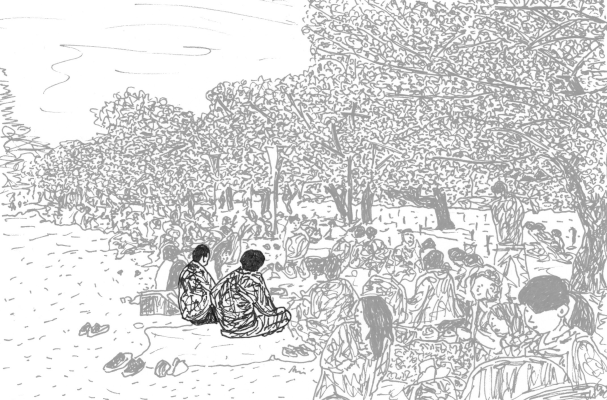 |
(Italiano) Un'altra avventura sta per concludersi e i Ragazzi possono essere soddisfatti. Durante un picnic tra i fiori di ciliegio, Heinz si commuove fino alle lacrime. Allo stesso tempo, cresce in lui il desiderio di saperne di più sul mondo degli spiriti, sull'anello e sui viaggi magici. |
(Deutsch) Wieder geht ein Abenteuer zu Ende und die Jungs können zufrieden sein. Beim Picknick unter den Kirschblüten ist Heinz zu Tränen gerührt. Gleichzeitig wächst in ihm der Wunsch, mehr über die Geisterwelt zu erfahren, über den Ring und über die magischen Reisen. Normal Version | ||
Tag 21 1 Helmut: Ey, kannst du mal aufhören zu heulen, Mann! So schlecht singt Takumis Vater nicht. Naja, gut, es ist eher laut als schön, aber das gehört dazu. Karaoke unter den blühenden Kirschbäumen! |
Day 21 Helmut: Hey, can you stop crying, man! Takumi's father doesn't sing that badly. Well, okay, it's loud rather than beautiful, but that's part of it. Karaoke under the blossoming cherry trees! |
Jour 21 Helmut : Hé, tu peux arrêter de chialer, mec ! Le père de Takumi ne chante pas si mal que ça. Bon, d'accord, c'est plus bruyant que beau, mais ça fait partie du jeu. Karaoké sous les cerisiers en fleurs ! |
Giorno 21 Helmut: Ehi, puoi smetterla di frignare, amico! Il padre di Takumi non canta poi così male. Ok, va bene, è più rumoroso che bello, ma fa parte del gioco. Karaoke sotto i ciliegi in fiore! |
Día 21 Helmut: ¡Eh, deja de lloriquear, tío! El padre de Takumi no canta tan mal. Bueno, vale, es más ruidoso que bonito, pero es parte del juego. ¡Karaoke bajo los cerezos en flor! |
2 Heinz: Ich denke, dass unser Geist ganze Arbeit geleistet hat. Das spiegelt sich deutlich in den Gesichtern wider. |
Heinz: I think our ghost did a great job. You can clearly see it on everyone's faces. |
Heinz : Je pense que notre fantôme a fait du bon boulot. On le voit clairement sur le visage de tout le monde. |
Heinz: Penso che il nostro fantasma abbia fatto un ottimo lavoro. Si vede chiaramente sul viso di tutti. |
Heinz: Creo que nuestro fantasma hizo un gran trabajo. Se puede ver claramente en las caras de todos. |
3 Helmut: Er hat viel gemalt, euer Vorfahr. Und ihr wisst jetzt mehr über eure Ursprünge. |
Helmut: Your ancestor painted a lot. And now you know more about your origins, too. |
Helmut : Il a beaucoup peint, votre ancêtre. Et maintenant vous en savez plus sur vos origines. |
Helmut: Il vostro antenato dipingeva molto. E ora sapete di più sulle vostre origini. |
Helmut: Vuestro antepasado pintó mucho. Y ahora sabéis más sobre vuestros orígenes. |
4 Heinz: Ein schönes Andenken. Oh, wer kommt denn da? |
Heinz: A nice souvenir. Oh, look who's coming. |
Heinz : Un joli souvenir. Oh, regarde qui arrive. |
Heinz: Un bel ricordo. Oh, guarda chi arriva. |
Heinz: Un bonito recuerdo. Oh, mira quién viene. |
5 Heinz: Er hat die Kette wiederhergestellt. Die Familie ist wieder mit ihrer Vergangenheit verbunden. Sie haben den Bruch gekittet. |
Heinz: He restored the chain. The family is reconnected to their past. They have mended the break. |
Heinz : Il a restauré la chaîne. La famille est reconnectée à son passé. Ils ont réparé la rupture. |
Heinz: Ha restaurato la catena. La famiglia è ricollegata al suo passato. Hanno riparato la rottura. |
Heinz: Ha restaurado el vínculo. La familia ha vuelto a conectar con su pasado. Han reparado la ruptura. |
6 Heinz: Helmut, ich möchte jetzt mehr über diese Geister, den Ring und die magischen Reisen wissen. Es muss doch jemanden geben, von dem wir das lernen können! |
Heinz: Helmut, now I want to know more about these ghosts, the ring and the magical journeys. There must be someone we can learn from! |
Heinz : Helmut, je veux en savoir plus sur ces fantômes, la bague et les voyages magiques maintenant. Il doit bien y avoir quelqu'un dont on peut apprendre ! |
Heinz: Helmut, voglio saperne di più su questi fantasmi, sul anello e sui viaggi magici adesso. Ci sarà sicuramente qualcuno da cui imparare! |
Heinz: Helmut, quiero saber más sobre estos fantasmas, sobre el anillo y sobre los viajes mágicos ahora. ¡Debe haber alguien de quien podamos aprender! |
(English) In a good mood, Fiona picks up her things and her friend Fanni from the agency and says goodbye to everyone and everything. In the parking lot, she relates that Heinz has expressed a great interest in visiting the haunted castle in Romania that Fanni's friend Nicoleta told them about. |
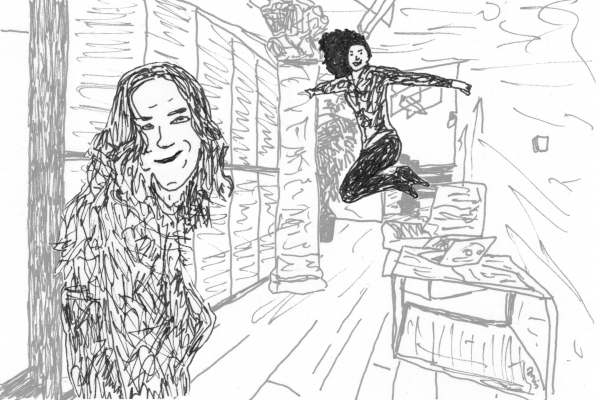 |
(Italiano) Di buon umore, Fiona va a prendere le sue cose e la sua amica Fanni all'agenzia e saluta tutti e tutto. Nel parcheggio racconta che Heinz ha mostrato grande interesse per visitare il castello stregato in Romania, di cui Nicoleta, la conoscente di Fanni, ha parlato loro. |
(Deutsch) Gut gelaunt holt Fiona ihre Sachen und ihr Freundin Fanni aus der Agentur ab und verabschiedet sich von allen und allem. Auf dem Parkplatz erzählt sie, dass Heinz großes Interesse daran gezeigt hat, das Spukschloss in Rumänien zu besuchen, von dem Fannis Bekannte Nicoleta erzählt hat. Normal Version | ||
Der letzte Tag Tag 23 1 Fiona: ♫ Dach und Fach, alles ist unter Dach und Fach. Hi Fanni, ich komm dich abholen. |
The Last Day Day 23 Fiona: ♫ Wrapped up, everything's wrapped up. Hi Fanni, I'm coming to pick you up. |
Le Dernier jour Jour 23 Fiona : ♫ Bouclé bouclé, tout est casé. Salut Fanni, je viens te chercher. |
L'ultimo giorno Giorno 23 Fiona: ♫ Tutto a posto, tutto finito. Ciao Fanni, sto venendo a prenderti. |
El Último día Día 23 Fiona: ♫ Arreglado, todo está dispuesto. Hola, Fanni, voy a recogerte. |
2 Fanni: Hallo Ma ... Wow, sie ist einfach so weitergegangen, als hätte sie uns nicht gesehen. |
Fanni: Hello Ma... Wow, she just kept walking as if she hadn't seen us. |
Fanni : Bonjour Ma... Wow, elle a continué à marcher comme si elle ne nous avait pas vues. |
Fanni: Ciao Ma... Wow, ha continuato a camminare come se non ci avesse visto. |
Fanni: Hola, Ma... Vaya, siguió caminando como si no nos hubiera visto. |
3 Fiona: Ach so, meine Schreibtischschublade. Ratsch, klimper, kratt, schb |
Fiona: Oh, my desk drawer. Rattle, jingle, scratt, shffl |
Fiona : Ah oui, le tiroir de mon bureau. Clic, tintin, krtt, chb |
Fiona: Ah, il cassetto della mia scrivania. Rtsh, tinntin, kratt, shb |
Fiona: Ah, sí, la cajonera de mi escritorio. Rtsh, tintin, krtt, shb |
4 Fiona: Wir kriegen einen Kredit von Hedu, das verrate ich dir schon. |
Fiona: We'll get a loan from Hedu, I'll tell you that right away. |
Fiona : Nous obtiendrons un prêt d'Hédou, je te le dis tout de suite. |
Fiona: Otterremo un prestito da Hedu, te lo dico subito. |
Fiona: Vamos a conseguir un préstamo de Hedu, te lo digo ahora mismo. |
5 Fanni: Hat er noch mehr erlebt? Nach eurem Urlaub in Portugal hast du ein paar Sachen erzählt, fällt mir da ein. |
Fanni: Did he experience even more things? After your vacation in Portugal, you mentioned a few details, I recall. |
Fanni : Il a vécu autre chose ? Après vos vacances au Portugal, tu as raconté quelques trucs, je me souviens. |
Fanni: Ha vissuto altre cose? Dopo la vostra vacanza in Portogallo hai raccontato alcune cose, mi viene in mente. |
Fanni: ¿Ha vivido otras cosas? Después de vuestras vacaciones en Portugal contaste algunas cosas, creo recordar. |
| Weiter geht's mit Staffel 10: Die Jungs im Spukschloss / The story continues with The Boys in the Haunted Castle |
| up |  |
| Datenschutzerklärung und Impressum (data privacy statement and imprint) |